A Mile in My Shoes
David K. Twitchell, MD Resident, Internal Medicine
I go to the doctor and what do they say?
That I need to eat healthy and start to lose weight. It is true. It is true. They are choices I must choose. But what would the doctor say if they walked a mile in my shoes?
If so, they would know the struggles that I face. Lower socioeconomic status and discrimination based on race.
They would get a sense of the fears I have nearly every day —
That a bullet will pierce my heart as I’m walking by the way.
They would know that myself and my children I greatly struggle to feed.
Yet I see others around me who perhaps have greater needs.
They would know that my house is in desperate need of repair.
And that with all my problems, I often feel great despair.
They would feel the pain I feel each day from losing my only son
To drug addiction and overdose just trying to have fun. They would know I smoke and drink alcohol to try to escape the pain.
Of the life I live in every day, it’s like walking in pouring rain.
They would understand my depression by seeing the panorama
Of the many years I endured of brutal childhood trauma. They would know why for my doctor visit I arrived 20 minutes late.
It was not from lack of effort, but the bus I took hit traffic and thus they had to wait.
Please know, Doctor, I am trying to do as you ask and lose weight.
But truth be told, I have much bigger problems on my plate.
If you could walk a mile in my shoes, I wonder what choices you would choose.
This work was inspired by the patients I serve at Robert B. Green Campus and aims to highlight the role that social determinants of health play in achieving health outcomes. As healthcare providers, we should strive to connect with our patients, but also recognize that we can never fully understand the challenges that each individual faces.
16
An Emblem of Freedom
 Sarah Cox
Student, Long School of Medicine, Class of 2023
Sarah Cox
Student, Long School of Medicine, Class of 2023
17
Photograph taken in Eatonville, Washington
I do
Hannah Cook
Student, Long School of Medicine, Class of 2024
On the day we said, “I do,” I promised to look after you, Though this was many years ago, It is something I still want you to know, As you’ve become older, I’ve become sicker Sadly, the fog that clouds my mind only grows thicker, I’ve lost myself in so many ways, It can sometimes feel like the end of days, Though I struggle to move as I used to, Each day I find strength in my bond with you, Young love can be fleeting, exciting, and new But old love is steady, solid, and true, You have always been there for me, Even when I can’t be there for you, unconditional and true, In the end, this is why we said, “I do.”
18
Compassion lasts a lifetime
Tomorrow it is.
Nathan Davis
Student, Long School of Medicine, Class of 2026
The man flicked his wrist adeptly, revealing his watch from under the white coat sleeve. The west-facing hallways had begun to dim from a blazing orange to a harsh and sickly white. Greyish stubble was beginning to protrude noticeably from his chin. With a hastened breath, he pulled his sleeve back down, straightened his posture, and tapped on the door.
A jolly voice rang out from inside, “Is that you doc? Come on in, take a seat, well geez take a seat!”
The doctor shuffled in, greeted by a characteristically timeless grin at odds with semitransparent skin that was stretched like a canvas over a frame of bones.
“Mommmm when is dad going to be home? He said he would come back in time for dinner, but it’s bedtime now, and I haven’t even said goodnight.”
A little boy swathed in blankets leaned his head over the edge of the bed, straining to glimpse his mom through the shining crack of the door ajar.


In the adjacent room, a woman hunched over a keyboard entering grades into her school’s faculty portal. Without averting her gaze, she cast her voice, “Go to bed, we have school tomorrow, and I’ll leave you at home if I have to wake you up a second time!”
The boy rolled back onto his pillow with an emphatic sigh.
An observer at the bedside might have closed their eyes and mistakenly flipped which voice belonged to the doctor and patient. “Well now, you certainly look like you could use a neat liquor,” chortled the frail man. “How is your son doing, did he win that soccer game you told me about last time?”
The doctor scoffed, “Thank you for asking, he did indeed. He even scored, although for the wrong team.” Looking down at his notes, he inquired, “How are you feeling with that new medication?”
“I’m feeling much better today, that aching pressure in my right side has lessened. You know old sport, why don’t you keep it brief today and head home?”
The doctor flipped the page, showing the new orders for palliative care he had written a few days ago — 300 mg of morphine daily. As something began to rise in his throat, he swallowed and retorted, “I appreciate the offer, but you can’t get rid of me that easily.”
“Well, if you insist. I do have a question, although I’m not sure you can help,” replied the man. He looked up at the doctor, the signs of weariness suddenly weighing more heavily on his face. “I am having trouble staying awake in the afternoons, even when my granddaughter comes to visit. I keep beating myself up for it. Sometimes I’ll be talking to her one moment, and in the next, I’ll wake up and she’s gone back home already.”
19
“Hmmm,” the doctor murmured tritely. “I can reduce your morphine dosage, but I know last time we discussed that your pain was worsening and keeping you awake at night.”
“Ahh, I figured,” quipped the man, remorse wrinkling his face. “I guess I can’t expect much more; although, what I wouldn’t give to even join you out on the lake again with our families.” Adopting a sterner look while shaking his finger, the man chastened, “Now, don’t you forget to take everyone out next weekend. If I’ve taught you anything, you should remember that the bass are spawning soon with the weather getting warmer. And I taught you everything.”
The two companions shared a growing smile before letting out a few tired chuckles.
The moon was shining brightly on the patio as the doctor fumbled with his keys at the door. He entered softly. Walking by his son’s bedroom door, the father paused and whispered, “Goodnight kiddo.”
“Goodnight Dad,” the little boy whispered back, mildly shocking the man.
“Aren’t you supposed to be asleep,” countered the father.


Ignoring his father’s response, the boy entreated, “Could you tell me a bedtime story?”
Twinkling, the father drifted in and pulled up a chair to his bedside. Pondering for a moment, he cleared his throat and met his son’s gaze. “Once upon a time, I was a young man not much older than you. Well, maybe three times your age. It happened one year that I was entranced by the thought of reeling in a great, big bass for dinner. Gathering my shiny new fishing rod, bait, and tackle, I remember tromping over to the nearby park to test my luck at the creek. But, as I sat eagerly on a tree stump, the hours dragged on into the evening with no tug on my reel. While I held my sad slackened line and thought about packing up, an older gentleman fortuitously walked by and noticed my dispirited expression …”
Outside, as the moon summited the cosmos and began its descent through the forest of stars, the young boy was held riveted to a story of fishing and laughter, of friendship and lessons.
The mother closed her screen and tiptoed out of her office. She glanced into the dimly lit room, smiling at the scene. The cadence of peaceful breathing filled the air. Her husband was leaning precariously on a chair, with his button-down shirt still tucked in. Her son was almost hidden, except for a glowing face appearing from within a nest of bedding. A trace of contentment seemed apparent on his lips. Somehow, he sensed the presence of his mom peeking in and weakly opened his eyes.
“Goodnight mom,” he mumbled.
“Goodnight.”
“I love you, ” he extended.
“I love you too.”

“See you tomorrow,” he finished.
“Tomorrow it is.”
20
A Living Memorial
 Alexis Lorio Student, Long School of Medicine, Class of 2024
Alexis Lorio Student, Long School of Medicine, Class of 2024
21
The National Covid Memorial Wall, outside of St. Thomas' Hospital in London, taken on a bright summer day. I was humbled to walk the wall and realize it would become a different version of itself on any given day.
Window to the World Terrence Stilson
Student, Long School of Medicine, Class of 2026
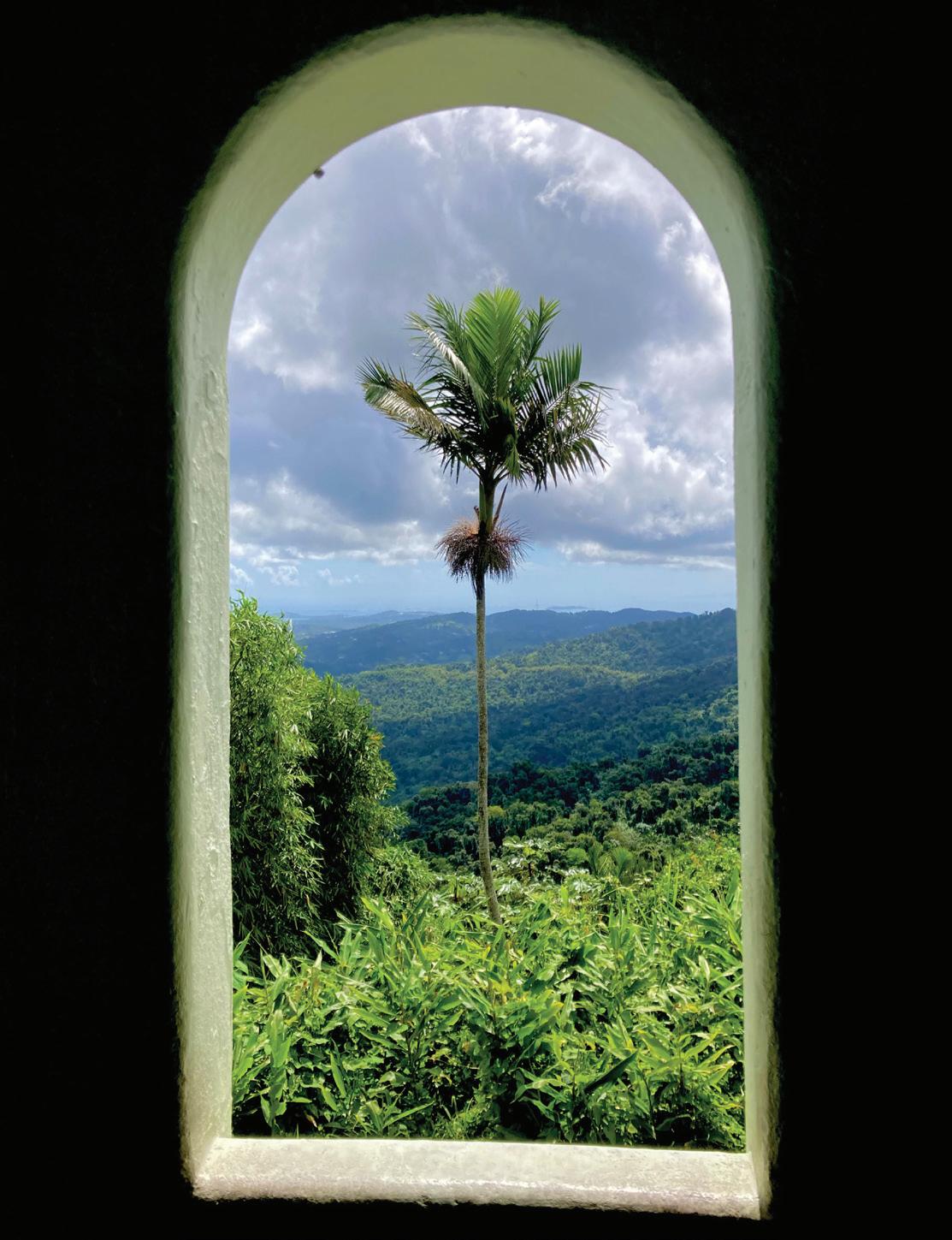
22
A view from Yokahú Tower in El Yunque National Forest of Puerto Rico
The Wedding Day
Leslie Omeire, MS1 Student, Long School of Medicine, Class of 2027
I never identified as one of the little girls who would dream about her wedding day for years on end. I was a late bloomer to this desire. But knowing what I know now, I'd say I was after it all along. Before my heart would ever become familiar with the desire for a white dress and a groom to pair with it, my mind danced with the splendor and awe of the white coat and a stethoscope to match it.
And on July 23, 2022, many of us experienced that wedding day together. It was a momentous occasion: a ceremony that marked the beginning of the rest of our lives in the profession of medicine. We were dressed to the tee; face beat, hair done, nails painted, and donned in white. Loved ones traveled from all over to celebrate our journey here. We professed vows that reiterated the covenant we were choosing to keep with such a sacred vocation. I never thought to succumb to the temptation of cold feet because I felt that this was something worth dedicating my life to, even knowing that pain would come with it. After all, love is not without sacrifice. Maybe some would consider a woman blinded by love to make such a commitment. They'll say that I’m giving up on my twenties or even on the experience and beauty of motherhood. But I'd rebut; because to love in the space of medicine could quite possibly make life more meaningful in all the other spaces. Maybe that's the mysterious romance of medicine? In demanding so much from somebody, it forces an opening of the
reservoirs that we had not yet discovered and allows us to give the parts of us that were hidden all along. Of course, I think it's wise to consider the toll that this kind of love will take on any human heart. It's heavy and there is no prenup. Forget about the honeymoon too - it all just kind of hits the fan real quickly.
But I know that everyone who has ever loved deeply and loved well has said that it was worth the sacrifice, that it was worth the risk. Call me crazy for stepping into this marriage, but I hope to give more than this could ever take from me. I’m vowing to protect and nurture the parts of myself that fell in love with medicine from the beginning. At the end of the day, I hope we make each other better. I pray that others are eternally impacted by our union, and I hope this partnership leaves the world searching for the kind of love we shared. I’m also fighting for a better narrative, you know? In a world where medicine is too often experienced as the cheating mistress or back-stabbing spouse, I want better. We deserve better and the future generation of physicians deserves to know that such a love exists so they too can cling to that belief and fight for it themselves. Regardless, I'm in for the long haul. I made an oath, and I have every intention to keep it. So, here's to one of the greatest labors of love that I have chosen to commit my heart and mind to. Here's to forever, for better or for worse - so help me God if it’s the latter.
So much of medicine personifies the sacrificial love shared in the covenant of marriage, a Holy Matrimony. I feel as if our White Coat ceremonies symbolize a Wedding Day. Everyday thereafter represents the sanctification we experience through this relationship with medicine, the colleagues we grow through it with, and our beloved patients who become recipients of the love we share.
23
heart-to-heart
Oil paint on canvas
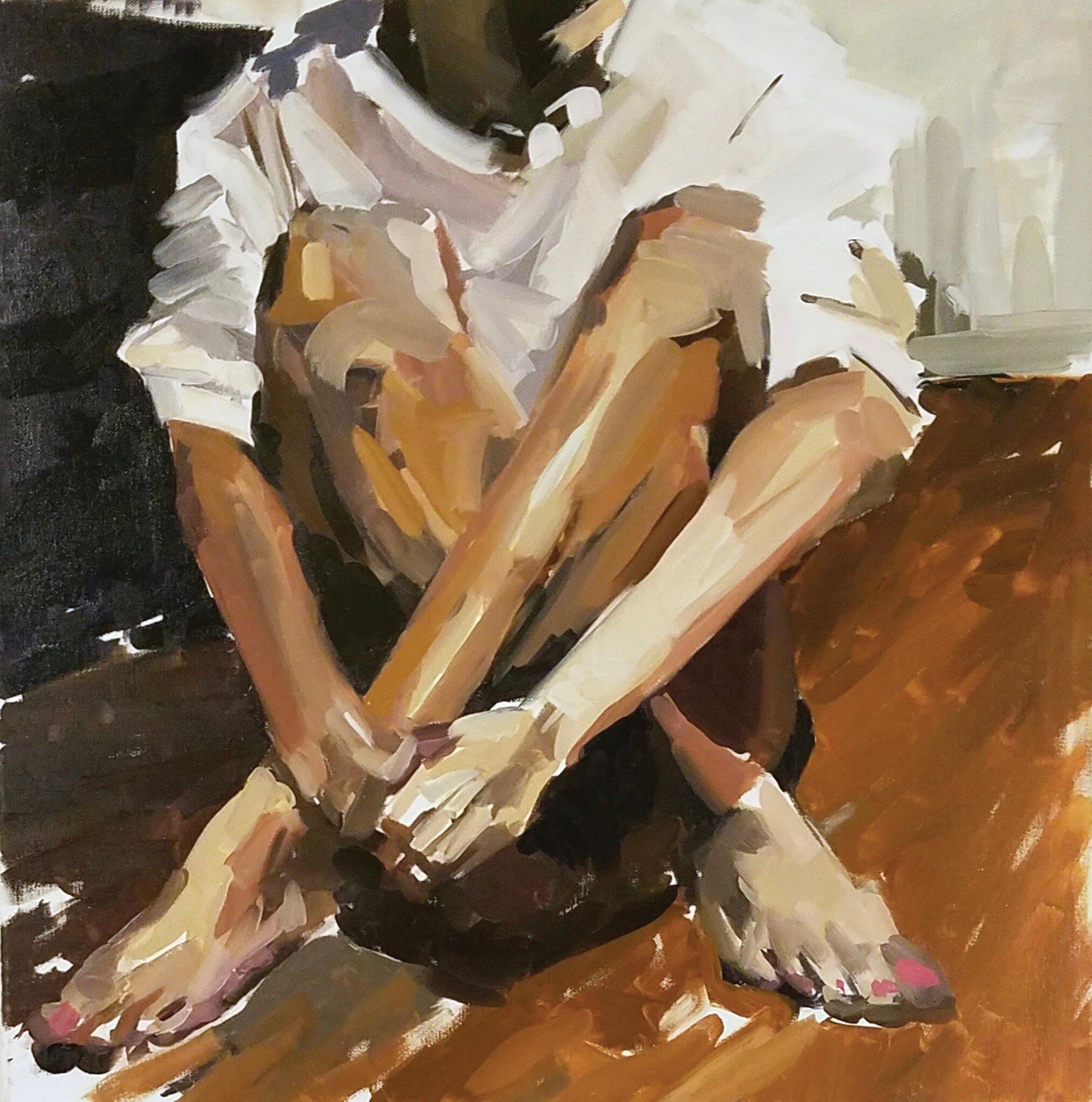 Katherine Thiel, MD Resident, Internal Medicine
Katherine Thiel, MD Resident, Internal Medicine
24
55-WORD STORIES
Susana
Nina Nguyen
Student, Long School of Medicine, Class of 2025
Susana sat in our waiting room. When approached, she asked, Not above a whisper, “Why is my hair falling out?” When touched, she flinched. I saw a large scar overlying her scalp. She began to cry.
He used to hurt her. Scratch. Scratch. Scratch. I laid my hand on her scalp. Some scars never heal.
When I first met "Susana," she was too scared to even be seen at our clinic. It took weeks for her to open up to me, and when she finally allowed me to examine her head, I was shocked by her scar. Sadly, I never saw her again, but I often think about her.
55-WORD STORIES
Sammar
MD, MPH
Resident, Department of Radiology, Alumni Class of 2021
He wrote
“I’m sorry I am a bad patient”
“I had a cancer surgery so now I can’t talk well with the tracheostomy”
“I am sorry I make everything difficult”
But it is not his fault
Why apologize?
We take what life gives us
He did nothing wrong
I wiped his tears
And later mine
25
"I am sorry I make everything difficult"
Ghannam
The Charred Witch
Abhishek Soni
Student, Long School of Medicine, Class of 2025
IO Prince whose daughter I am called, whose heat would scald my skin, breath sear my lungs, and clutch wither my sinews and bones: When we meet, will you, too, find me too putrid to touch?
Will Moloch shun my blood, Mammon my gold?
Beelzebub my flesh, and you my soul?
Will my stench turn the acrid brimstone cold? my toes kill the glow of Gehenna’s coal?
We both received the same rebuking call, after our battles, futile to have fought, you from the inerrant Judge observing all, and I by preaching men who witnessed naught: “Thou’rt not here welcome; these doors shut to thee.”
So if not to Tophet, whither will I be?
How do you bear such so abhorring stings, by Paradise and by Creation still?
Mercy may have kept it from His will to teach you love and thence the pain it brings. My tea was steeped in water from the springs of my care, trust, respect, and whist goodwill. Ink like my blood gave life to my love’s quill, and I wove gifts of lace from my heart’s strings.
All-knowing God knew not to not have known the kiss foreknown when his apostles ate, whilst you love none but your unloving throne, O Lucifer, my kindred reprobate.
Would, though, that I had heard my Salem groan my stake would pose too burdensome a weight.
O Salem, tell me whence you’ve built my case. “I’ve seen the ill her spirit works to do!”
Because I’d asked to dye a sleeve of lace?
“My neighbor’s wife did too!” – “And aye, me too!”
Of every form to fall before his view, not one that your Accuser saw was I; In restless quest for one condemning clue, you’ve stripped the clothing from my groin and thigh.
I’d slit my veins myself if you’d not try to search the splatter for the Serpent’s face. Since I was born a woman? Is that why?
Since Eve was tempted first to fall from grace?
If lace so short must be a poppet’s part, your wisdom had me damned from the start. Why need you tie my mouth upon your stake?
What would have voiced this voice of Satan’s sworn?
That I am as innocent as the child unborn?
Or was it better for your consciences’ sake to scorch away my love, mute my heart’s ache, and burn my personhood with fires of scorn, to leave a woman loathsome and forlorn: the charred witch your pyre was bound to make?
That, of my name, the Devil cannot tell, all-knowing God knows doubtless to be true, so, how hot, Salem, did your fires swell, which only Gallows Hill can now subdue?
There, I shall flee into the flames of Hell and pray, my friends, that Heaven waits for you.
Medicine and healing are built on evidence, but we can easily “find” clues that are not truly present if we are already convinced we will find them. “I am as innocent as the child unborn” are among the very few recorded words of Bridget Bishop, who was convicted of witchcraft under a mountain of evidence. For example, she endured a physical exam where a “witch’s teat” was found on her perineal skin, considered proof of collusion with the Devil. The Puritans of 1692 could “find” evidence to confirm the preconceptions already born out of religious hypocrisy, sexism, and groupthink, and the brains under our calvaria are just as susceptible to confirmation bias and belief perseverance as theirs. We too have lives in our hands just like that of Bishop, the first of nineteen to be hanged. This poem draws on court records, sermons preached at Salem, and the language of early English Bible translations to portray the tragedy of the 1692 Salem Witch Trials.
26
II
"Addictive Personality"
Graphite and ink on toned paper
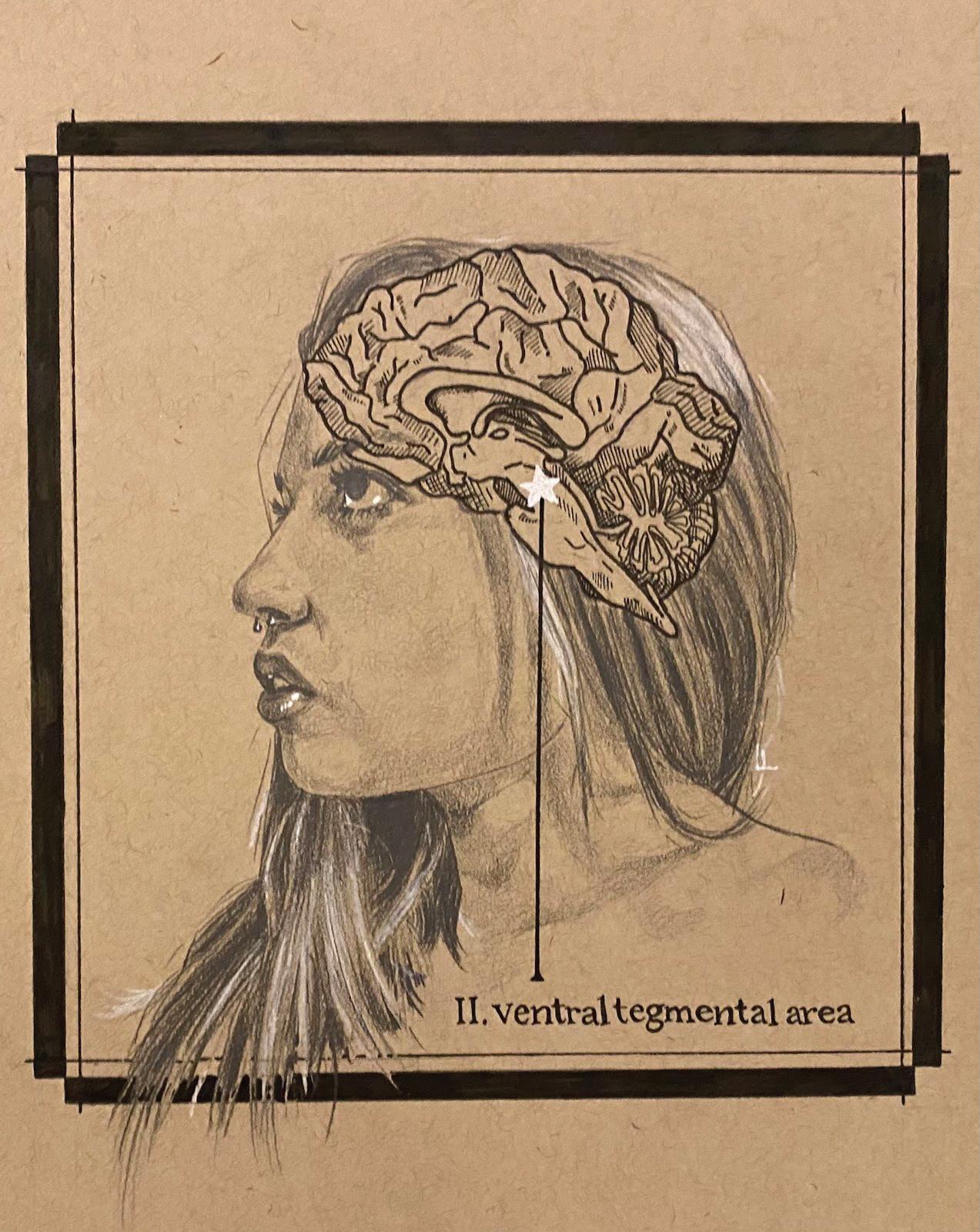 Annie Flores
Annie Flores
Research Assistant, Cell Systems and Anatomy, Barshop Institute
27
Poems on Mental Health
Abhishek Soni
Student, Long School of Medicine, Class of 2025
REFLECTION
My duel stalls against a dreadful foe, Our daggers crossèd by my trembling hand. Where should be tears, his lust and ire flow; His gaze a strident stare none dare withstand. No path is safe from his abhorrent feet, No word unheard by his conniving ear. His parching eyes will suffer no retreat; His foul mouth and rotten reach draw near.
Frigid is his creeping pace, Hunting me with those I love; Yet his fiery, incessant chase Leaves us no escape above.
I cannot rend his wretched arm; alas, This dagger will not harm the mirror’s glass.
LETTER TO DEATH
Kiss me, for then my ever restive tongue Shall silently submit to thy behest. And tear apart my flesh, for thee too young, Now weary, ever wanting of thy rest. And worries, should I lie upon thy breast, Shall fade, with fear, grief, shame, and misery. To sleep with thee, for evermore caress’d, Not even dreams would dare awaken me. I yearn for thine embrace impatiently, For in thine arms I’ll long for love no more. Need I? So steadfast only thou wilt be To leave me never, and for no wherefore, Ere God’s return to pry thee from my side, So I shall wait, until our knot is tied.
This pair of poems is about my struggles with mental health, which I hope might provide some comfort to someone else who might have had similar feelings. The first is about self-image and the allure of self-harm; its third quatrain is in the catalectic trochaic meter. The second I wrote to help myself overcome suicidal ideation, trying to take solace in the inevitability of death as a way to wait for it and hold out, in blind hope for what might yet come.
If you or a loved one are struggling, understand that there are resources available to help:
UT Health SA Student Counseling Center: 210-567-2648
National Suicide & Crisis Lifeline: 988
28
Margins to Mainstream
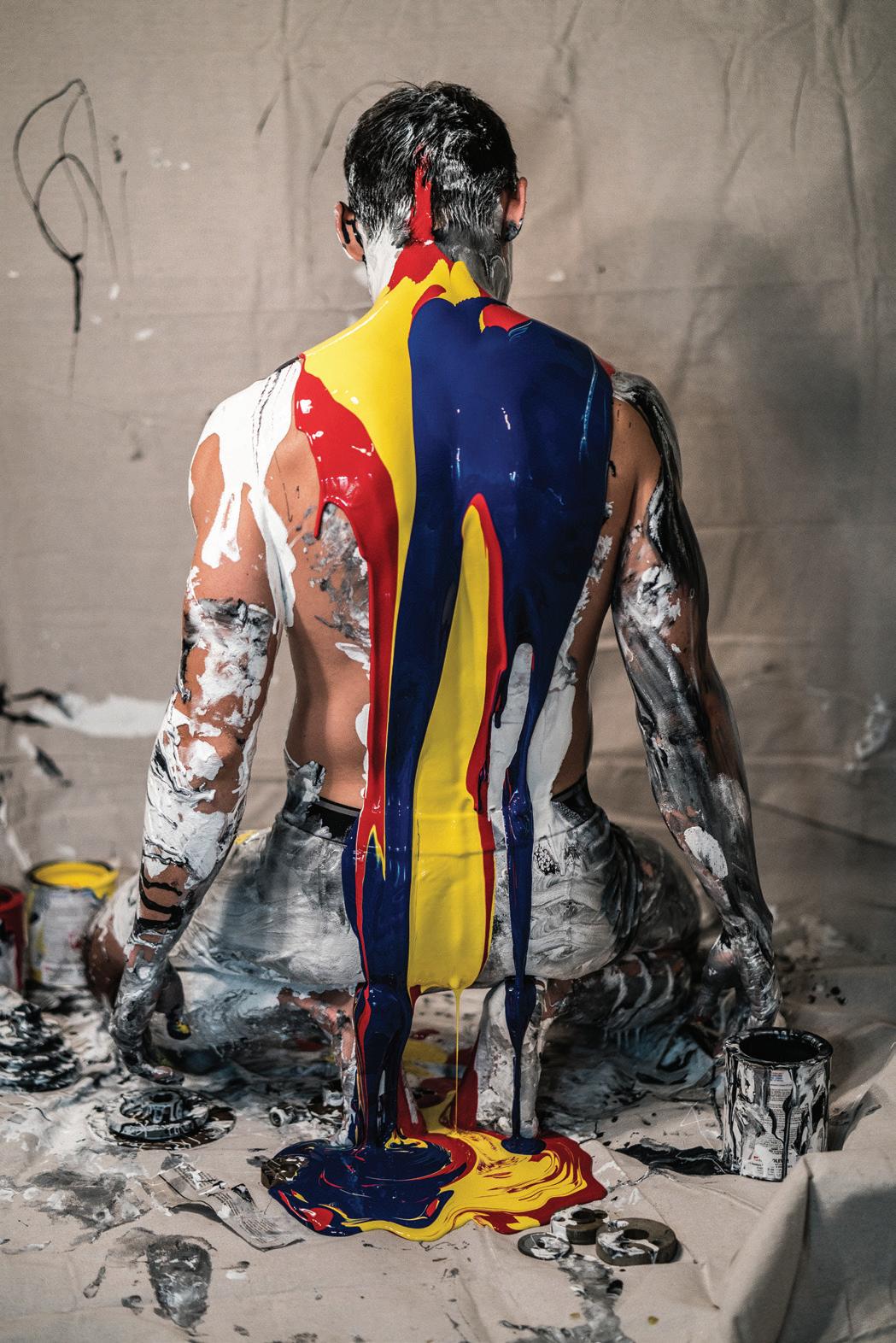 Nancy Gillcrist, MD, USAF, Capt
Resident, Urology, Class of 2023
Nancy Gillcrist, MD, USAF, Capt
Resident, Urology, Class of 2023
29
Racial Reckoning
Mohamed Omar
Student, Long School of Medicine, Class of 2025
"Pfft! No! Not even once in the past five years. You know you shouldn’t believe everything you see on the media, right?" I scoffed in response to my high school pal's inquiry about whether I had encountered any racism during my time in the US of A.
Growing up in Kenya, the concept of racial prejudice based on skin color was practically non-existent. In fact, it would be quite the feat to discriminate against more than 99% of the population there.
After the George Floyd incident, the world was made aware of some of the not-so-great aspects of living in the United States. My friend, understandably, was a bit worried about me. We hadn't been in touch for a while, so he shot me a text asking about my experience living in America. I reassured him that while incidents like that do happen, they're not as common as the media makes them out to be and that I am often surrounded by friends and well-mannered people who respect me for who I am.
Little did I know that my luck was about to run out the following day. One sunny summer afternoon, I decided to head to the local hardware store to pick up some supplies. I threw on a backpack and baseball cap and set out on my first experience with racial profiling. Now that I think about it, maybe it had happened before and I was just too naive to recognize it. But in any case...
As I strolled down the sidewalk, I noticed a couple staring at me from outside their house. I thought to myself, "Maybe they haven't seen
you in this neighborhood before, so be a good lad and show some respect" as I nodded my head in their direction and continued on my way.
A few blocks later, the couple in a car pulls up next to me, rolls down their window, snaps a few pictures of me, and speeds away. Wait, what just happened? It all occurred in a matter of seconds, leaving me no time to react. I just kept walking, feeling sorry for the people who live in fear of people like me simply because of the way I look.
I kept the receipt after that, just in case the police showed up and asked me what I was doing walking down a public street in broad daylight. Just in case the detective couple finally decided that their delayed delivery must have been stolen by the "suspicious" person of color who happened to be walking down the street.
After this incident, I realized that racism is a real problem in America and it should not be brushed off.
I also realized that it is not just about the big events that make headlines, but also about the small everyday incidents that can be just as hurtful. Everyone has a role to play in creating a more equitable and just society, and it starts with being aware of our own biases.
It has been about six months now and nothing has come of it. Maybe it's time to toss that receipt and move on with my life, but with a more aware mind and open heart.
30 AUSCULTATIONS
Reflections
Graphite
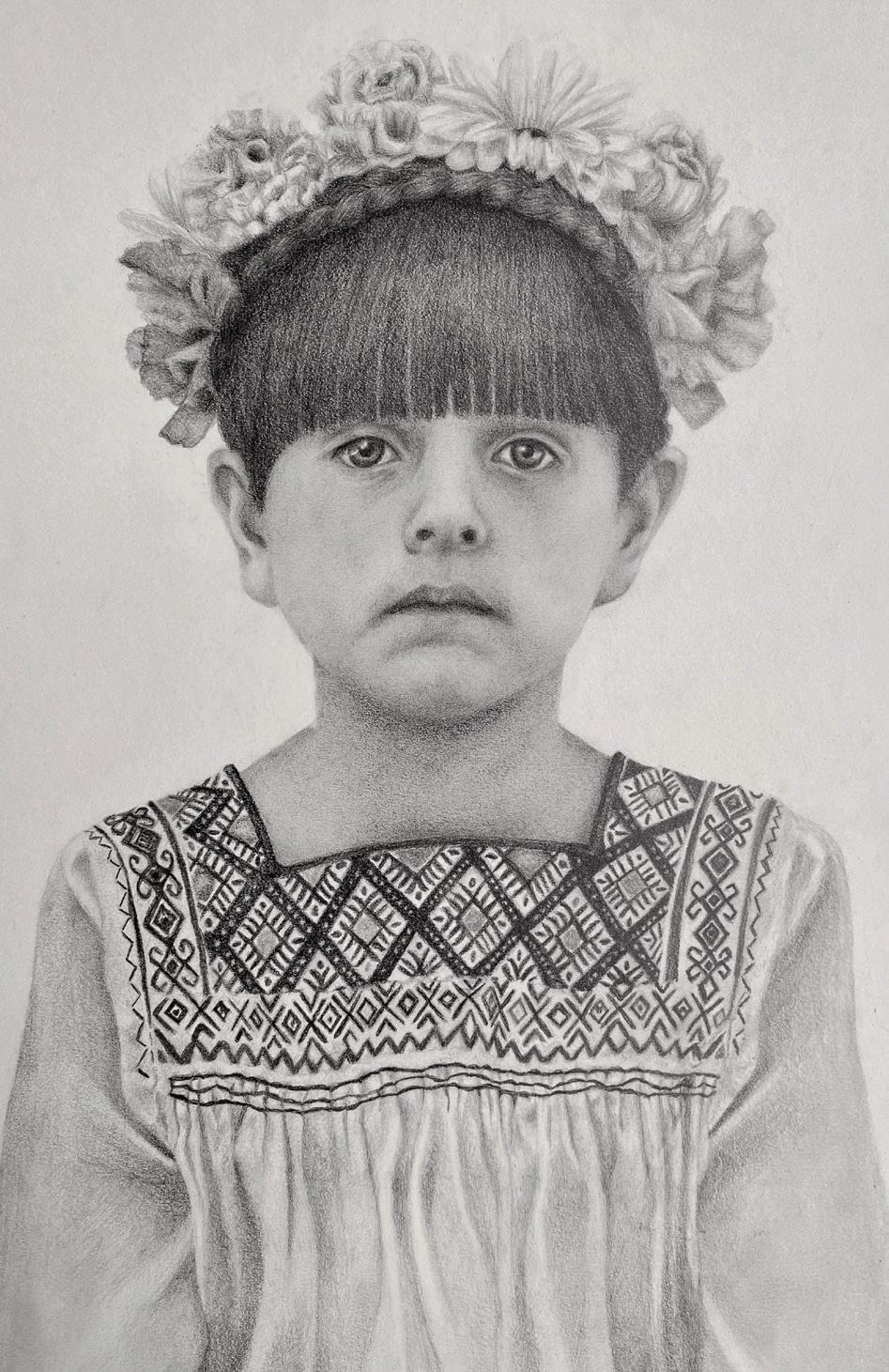
Anu Singh
Student, Long School of Medicine, Class of 2026
31
This piece is a graphite drawing of a young girl dressed in the style of artist Frida Kahlo.
Transitions: The End of Winter

Andrew Wilkey
Student, Long School of Medicine, Class of 2024
32
Elegy
Beverly Hu
Student, Long School of Medicine, Class of 2026
I have spent decades molting her. Peeled and pulled, bathing calloused fingers beneath lukewarm faucets. She is here, now, limp in my arms.
She was a C-section baby, reluctant to forfeit her amniotic safety –so when everyone else danced and kissed boys and learned to drive, she hid at home and gouged her bruises like the mush of an overripe peach; she ground her edges against a whetstone until they were sharp enough to reflect light.
I have hung her up in the back of my wardrobe, behind a row of awkward pre-teen blouses. She would be safe here, but I hate the smell of musk –so I douse the wood with kerosene, strike the match with a hiss, and stand back as the finely crafted lumber is swallowed by heat.
I have watched a thousand sunsets through her eyes, and never known red. She is smoke, now, and I am an invitation, flesh and bright.
33
White Sand, Blue Sky
 Andrew Ta
Student, Long School of Medicine, Class of 2026
Andrew Ta
Student, Long School of Medicine, Class of 2026
34
A Cloud's Desire to Rain
Megana Challa Student, Long School of Medicine, Class of 2023
I drew glimpses of my future in the condensation on the frosted glass. With dew on my fingertips, I booped my baby brother’s nose and began to run outside. A rush of cold air and mist almost pushed me back, but I kept going. I wanted to dance in the rain, to look like those heroines I watched on TV, rippling their skirts and waving their hair to the tunes that only they could hear. So I did. Until my mother yelled from the screen door that I would get sick. I knew I wouldn’t. I was named after the raincloud, there’s no way it’d hurt me.
I left the hospital almost twenty years later, my shoulders weighed down by the unanswered pleas and forgotten desires that were still hanging in the air around the patient rooms. It was a particularly difficult week on the pediatric gastroenterology service – a four-year-old boy was in multiorgan failure, a fourteen-year-old girl was caught up in a very dangerous trade, and a five-year-old girl’s vibrancy was slowly fading as her body began rejecting her transplant organ. The boy couldn’t bear to look at me from fear, the young lady didn’t speak to anyone on principle, and the little girl tried but failed to let me color with her. I was tired from their battles.
My parents named us Megana, Trisha, and Varun. At first glance, it seems like a random assortment of names that abbreviate to a popular pop television channel if you really think about it. But my parents didn’t know that – they named us after months of pondering what sounded most
cohesive. It wasn’t until years later that I uncovered the deeper meaning. Megana, Trisha, Varun. Cloud, Desire, Rain. And what do clouds desire to do? Rain. We were meant to be a family unit in this world.
I take a lot of things in life as signs. That I independently ended up deciding on the same specialty as my uncle who practices a couple of continents away. That I asked for one sibling to play with and instead was blessed with two. That I was able to experience my first Mardi Gras right before the pandemic swooped in and shut everything down. It’s amazing how much we can plan, and yet, life oftentimes decides otherwise. There’s so little control – we can only provide the framework. The cloud will either desire to rain or it won’t.
The second I walked out of the hospital and felt that first drop on my face, images flashed in a sequenced array at the forefront of my brain. A coloring book only half completed. A chocolate chip cookie in various states of dismemberment. A curtain of hair covering her face. It felt as if the rain droplet was moving inside my brain, activating key snapshots from interactions with each of my patients today. But rather than trigger me, it was soothing me – it was saying, “don’t worry, I’m here to wash it all away.” And just as that drop slowly metamorphosized the memories of my patients into memories of my childhood, I hoped that the downpour would wash these children’s pain and worries away.
35
Rain is my familiarity, my source of comfort.
on names
Sajani Raja Student, Long School of Medicine, Class of 2024
i think often about how i would name my children i can’t give them christian names. i can’t. it would not protect them from the othering that their skin color will bring and when society shuns them it would give them nothing to latch onto, nothing to remind them that although they are Other here, they are not Other everywhere
that is what my name is to me, after all a connection to the 24-year-old woman who took an airplane across the sea to improve her two-year-old daughter’s future without knowing the language of her destination
my name is a sign of love and care from the four sets of hands that raised me their desire to see me grow made manifest, nestled in layers of tradition a reminder that my culture is not just a chain wrapped around my ankles, constricting me in white america’s expectations, but rather a string of links intentionally joined together, generation by generation
sajani (beloved) and yet.
as much as my name is mine it is just one word.
one word from a language that isn’t mine. a language that will never be mine.
it is a connection, frail, worn thin by decades of distance, to the man with a work abroad scholarship and a dream and naught but the shirt on his back the man who carried me on his shoulders and taught me to fold paper airplanes and play carrom the man who will likely forget the only language i can speak before he forgets my face
36
never before has the gulf between us felt so vast gulfs, too, have been on my mind gulfs between who i am supposed to be and who i am supposed to be who i am is, in actuality, a liminal space
it is knowing how to drape a sari but not how to properly fit a sari blouse it is knowing the parts of an indian wedding but not how to plan one it is knowing what garam masala is but not how to use it
who i am is reading arjuna’s triumphs and dancing sita’s struggles and watching my dad make sambar on sunday mornings and possessing layers and layers of fragments and somehow those fragments never come together
it is the effort of trying to learn what should be innate but was never mine to begin with
who i am is reading don quixote in the original spanish but needing subtitles for bollywood movies baking pie with ease yet outsourcing my gulab jamun seeing diwali reduced to a festival of lights and celebrating secular christmas instead (both holidays are equally meaningless, now) (but at least the latter is acceptable camouflage)
who i am is just enough to be Other but not enough to be anything other than lost how curious of white america to claim that they have no culture when it is staring them in the face, a belonging so ubiquitous and default as to not be noticed!
but if we are labeling anything alien to the white imagination as culture, then perhaps what i have is a culture too a pitiful solace this is, given the fact that if i ever had kids of my own i wouldn’t even know how to name them.
37
The woman in the poem is my grandmother, who could not speak or read English when she immigrated here. The man in the poem is my grandfather, who has Lewy body dementia.
Pets
Color pencils
 Divya Chandramohan, MD Fellow, Infectious Diseases
Divya Chandramohan, MD Fellow, Infectious Diseases
38
Made with color pencils on Bristol smooth paper.
Blended Cultures
Kim Clendenen
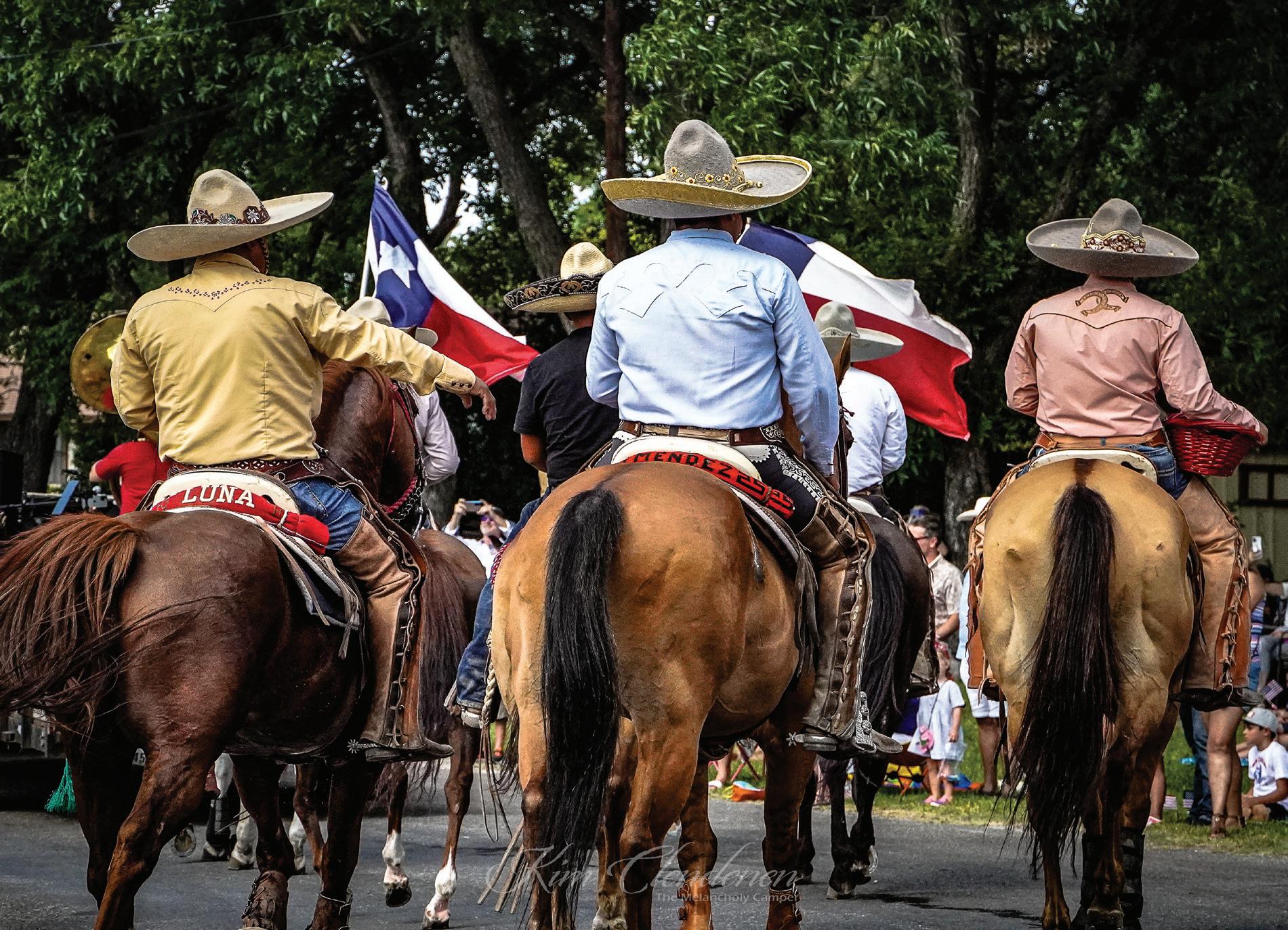
39
Staff, Strong Star ORU
55-WORD STORIES
Room 61
Alexis Lorio Student, Long School of Medicine, Class of 2024
I knock nervously. You, my first patient; I, with your final care team. We need not discuss overnight events. You call me hija while I hold your hand. Your lungs forbid you to save your breath. Your back spasms deny you rest. You have chosen comfort care over radiation. I ask, How is the pain?
55-WORD STORIES
Reflections
Andrew Ta
Student, Long School of Medicine, Class of 2026
Tomorrow when his nurses find him, they will mourn a lost battle against a constellation of invaders.
But tonight his defenses hold strong. And as he stares at the pastel blue walls, enveloped by the rhythmic beeping of the small room, he holds a portrait from his daughter’s wedding and has never felt more alive.
40
stay a while
 Beverly Hu
Student, Long School of Medicine, Class of 2026
Beverly Hu
Student, Long School of Medicine, Class of 2026
41
Treat the patient, not the disease
Becky Wang
Student, Long School of Medicine, Class of 2024
“Treat the patient, not the disease”
A kitchen table for an exam room
A statue of Guadalupe for a piece of equipment
A blouse and pants for a gown
Chief complaint: back pain
It hurts when doing housework and picking up her grandkids from school
Current medications: tamales and tortillas The ones she cooks in her kitchen to sell for money
Past history: Moved from Mexico to the United States many years ago
Family history: Wife, mother of 6, and grandmother of 21
Physical exam: Well-appearing woman at home with husband and daughter
Pertinent findings: Hard of hearing, still laughing and smiling
Upcoming appointment on December 12th: A celebration for the Day of the Virgin of Guadalupe at her daughter’s home
To-do items: Make indigenous-style costumes for the concheros at the celebration
Ready for discharge: The patient is staying, the student is leaving Signing the note: Updated from previous visit with new understanding
42
Carreta Tica
Acrylic on canvas
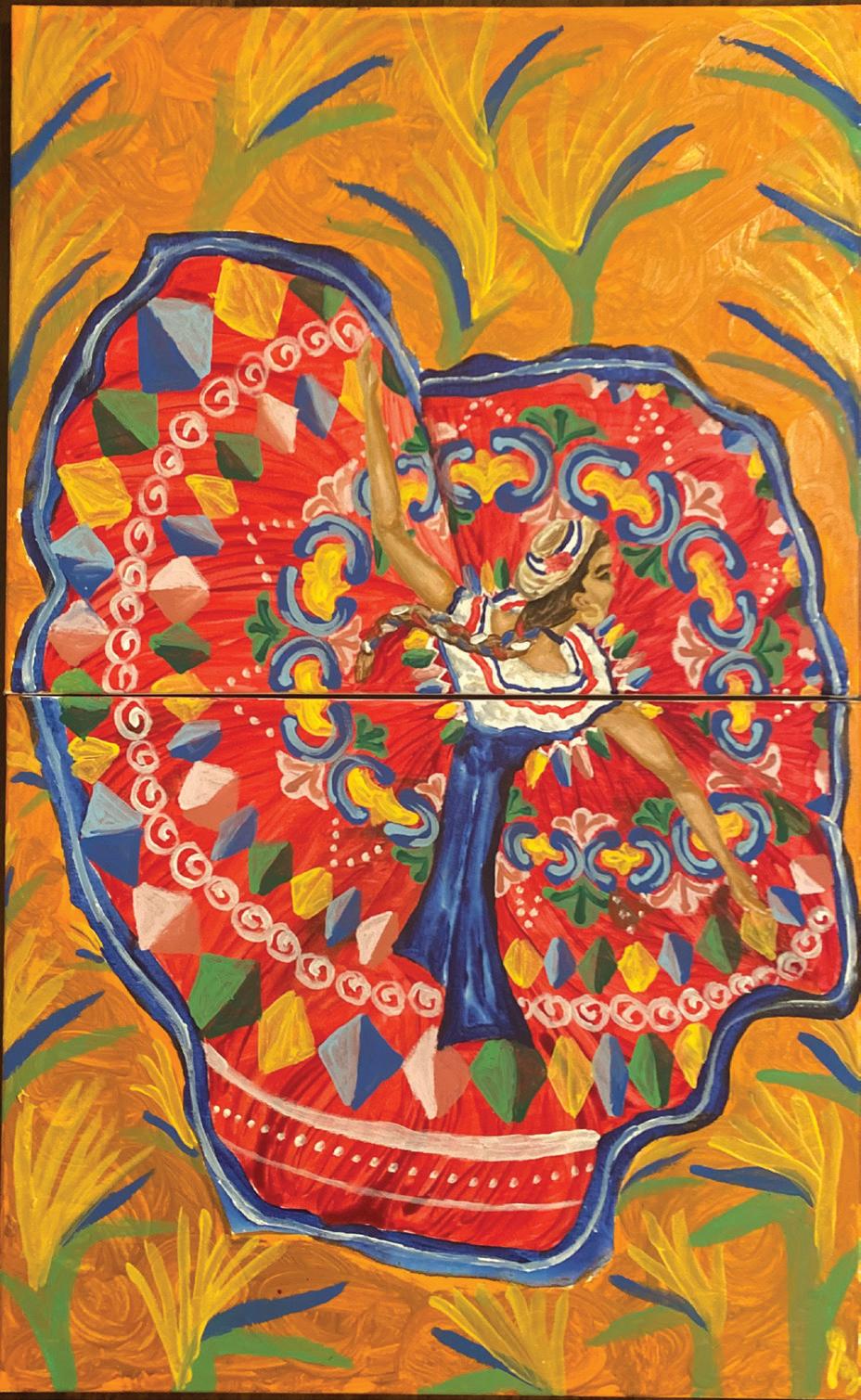
Lia Quesada
Student, Long School of Medicine, Class of 2025
43
Traditional Costa Rican folkloric dancer in an ox-cart patterned dress in a field of bird of paradise.
Big Bend National Park: View Near Desert Mountain Overlook
Oil on canvas
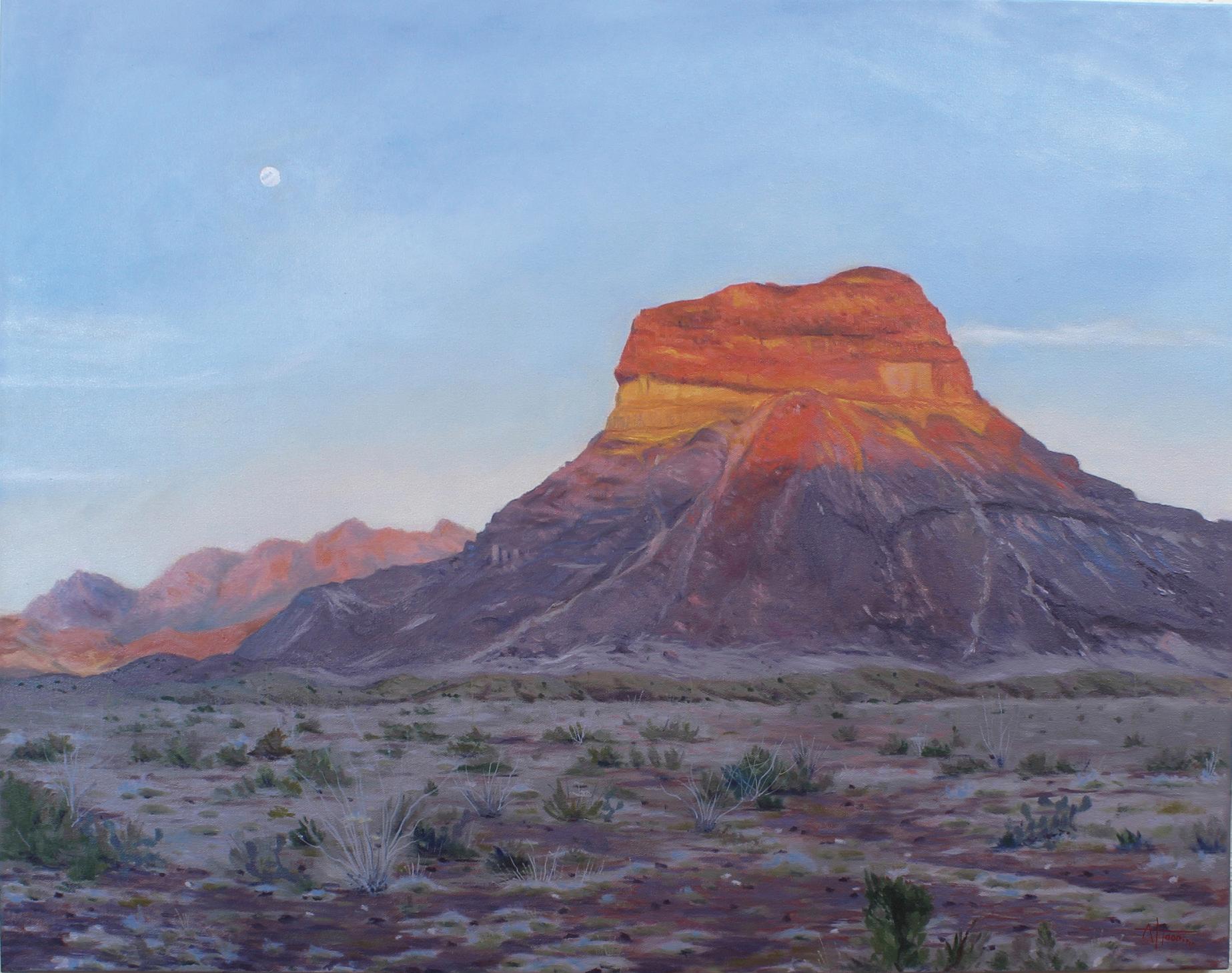
Alex Hood
Staff, Emergency Medicine
44
This oil painting captures an early winter sunset at Big Bend National Park. Long shadows from the towering Santa Elena Canyon blanket the valley and the base of Desert Mountain in darkness.
Home Visit to a Refugee Family
Basmah Barkatullah Student, Long School of Medicine, Class of 2024
We have come to talk of dreary things –Of missed appointments Of cockroaches Of back pains And rent’s due, But what about food?
Little by little we guests are regaled –With chai, and pilau, and gosht, and naan, Memories of the babbling mountain water, Valleys that echo with grandchildren’s laughter, Trees that give rich shade to a hundred-year-old father; Crumbs of the joy left behind in Noordistan, Now gifted to us incomplete healers.
This country is not so generous to refugees –The translator laments that Even charity is not really free. Still, the daughter turns to a new page And copies the clinic address, quietly, In Pashto and English, into her school notebook.
45
Chai, pilau, gosht, and naan translates to tea, rice, meat, and bread in both Urdu and Pashto.
55-WORD STORIES
A Hand to Hold
Abakar Baraka
Student, Long School of Medicine, Class of 2024
She walked miles, fleeing war-torn home. Exhausted, scared, alone. I held her hand, spoke words of comfort in her native tongue. Gave her hope, care, a chance for a new life. I was just a student, but in that moment, I was everything to her. Together, our community welcomes and supports her. Together, we heal.
This story is inspired by an encounter I had with an asylum seeker at the refugee clinic. The experience was a powerful reminder of the resilience and strength of those who have been forced to flee their homes and the importance of compassionate care for those seeking refuge. It is my hope that this story can serve as a reminder of our shared humanity and the importance of supporting each other.
55-WORD STORIES
Put Her There: My Reply
Nancy Gillcrist, MD, USAF, Capt
Resident, Urology, Class of 2023
Never spoken, Passed down from a mountain, Comically overdone, Earnest to live up to. Put her there.
Testament of pride. Passed down from a Gator, Untethered spirit and strength, A token I bestow. Put her there.
Hospital glazed. Time, Dialing, Silence, A presence, a moment, Breath of tribute to a legacy. “Put ‘er there Papa.”
My grandfather, [removed to keep anonymity], engrained the importance of a good handshake in me from a young age - the ultimate reflection of heritage and symbol of strength, determination, promise, and love.
During my time in medical school, he passed away. This piece tries to encapsulate the moment when I called to say goodbye, as his doctor on the opposite side of the country held the phone to his ear.
He once wrote a poem entitled “Put Her There”, which spoke to his value of the gesture. This is my response.
46
Losing you Charcoal
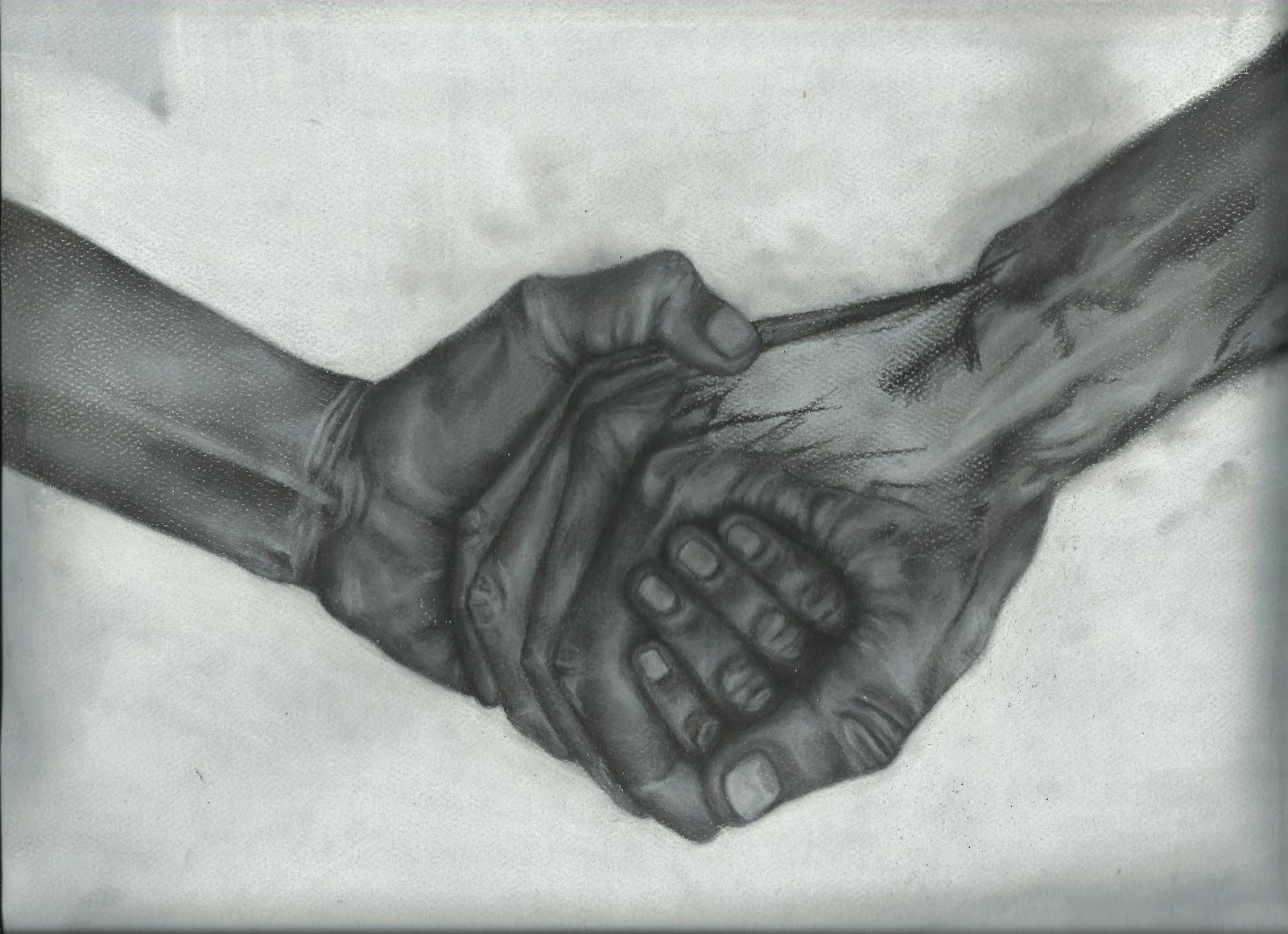 Averi E. White, MD Resident, Internal Medicine
Averi E. White, MD Resident, Internal Medicine
47
Expansive
 Sarah Cox
Student, Long School of Medicine, Class of 2023
Sarah Cox
Student, Long School of Medicine, Class of 2023
48
Padre Bay, Lake Powell, Utah
Don’t Forget Gouache
Lily Hahn, MS3
Student, Long School of Medicine, Class of 2024
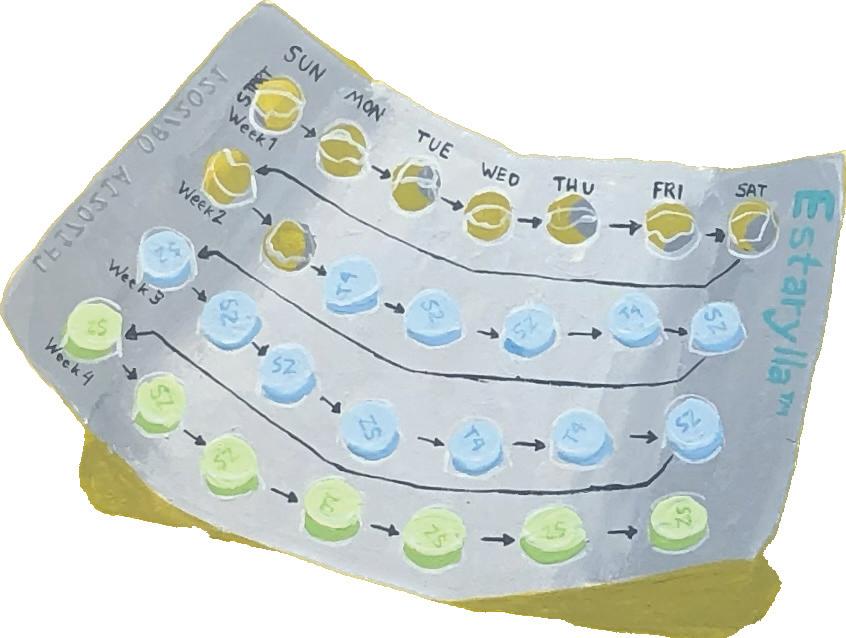
49
55-WORD STORIES
Cadaver
Nina Nguyen
Student, Long School of Medicine, Class of 2025
I have lived a remarkable life. But here — just a vessel of nerves, arteries, and veins. To be reflected, traced, and identified. Exposed.
I am the dead that teaches the living. But here, I am deadened. Cold, alone. As you hover, if only you knew, all of my adventures. I have lived a remarkable life.
We learn so much from our cadaver-based anatomy lab. Yet, how often do we stop and reflect on the lives our cadavers had previous to their generous donation?
55-WORD STORIES
Words spill out, sigh of relief
Stephanie Batch
Student, Long School of Medicine, Class of 2025
"Now recording"
He speaks freely, anecdotes spilling at the seams
Ready to be spoken into tangibility
Spoken of friends, of coworkers, of brothers in arms Community strengthened out of necessity
Hidden voices, whisper of feather boas Of trauma, of power, of advocacy
He says, "I feel a weight lifted" I say, "recording over. thank you."
50
A personal love letter to the HIV Storytelling: Narratives From South Texas Project and my experiences as an oral history listener and recorder.
Synergy
Colored pencil, marker, and pen
Patrick Joseph
Student, School of Nursing, Class of 2023
The community and those who work in the healthcare industry unite to create a cycle of bringing wellness to individuals, who in turn bring wellness to the world.
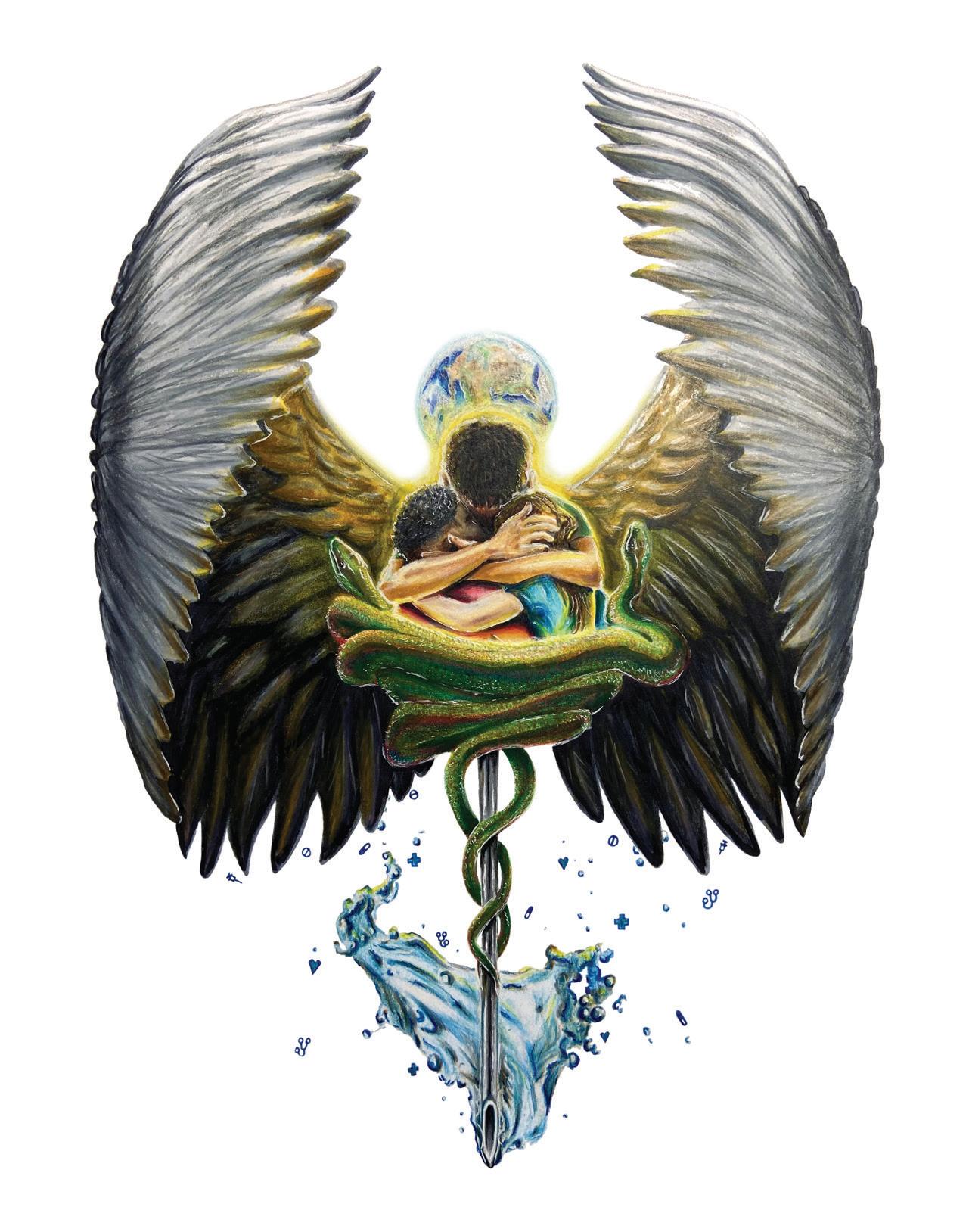
51
Uniquely Different, But Together: A Simple Four-line Rhyme Scheme
Bryan Ubanwa, MS2
Student, Long School of Medicine, Class of 2025
Graduate Science
Our scientists are leaders in laboratory science, pushing the limits of what we know Making breakthroughs daily, they lay the groundwork for what UTHSCSA has to show
Nursing
Our nurses work to provide personal care, truly the arms of our whole operation Guiding future nurses and doctors alike, they teach us our first lesson in cooperation
Allied Health Professionals
Our physical therapists literally and physically bring our community back to life Historically leading our patients through rehabilitation after being under the knife
Dental
Our Dentists are experts and magicians when it comes to fixing a smile Cavities, canals, and corrections, our docs are well-known for going the extra mile
Medical
Our physicians are the backbone of clinical medicine, giving heart and mind to the profession We are community servants who value every member without a question
52
"A Handful of Healing Professionals"
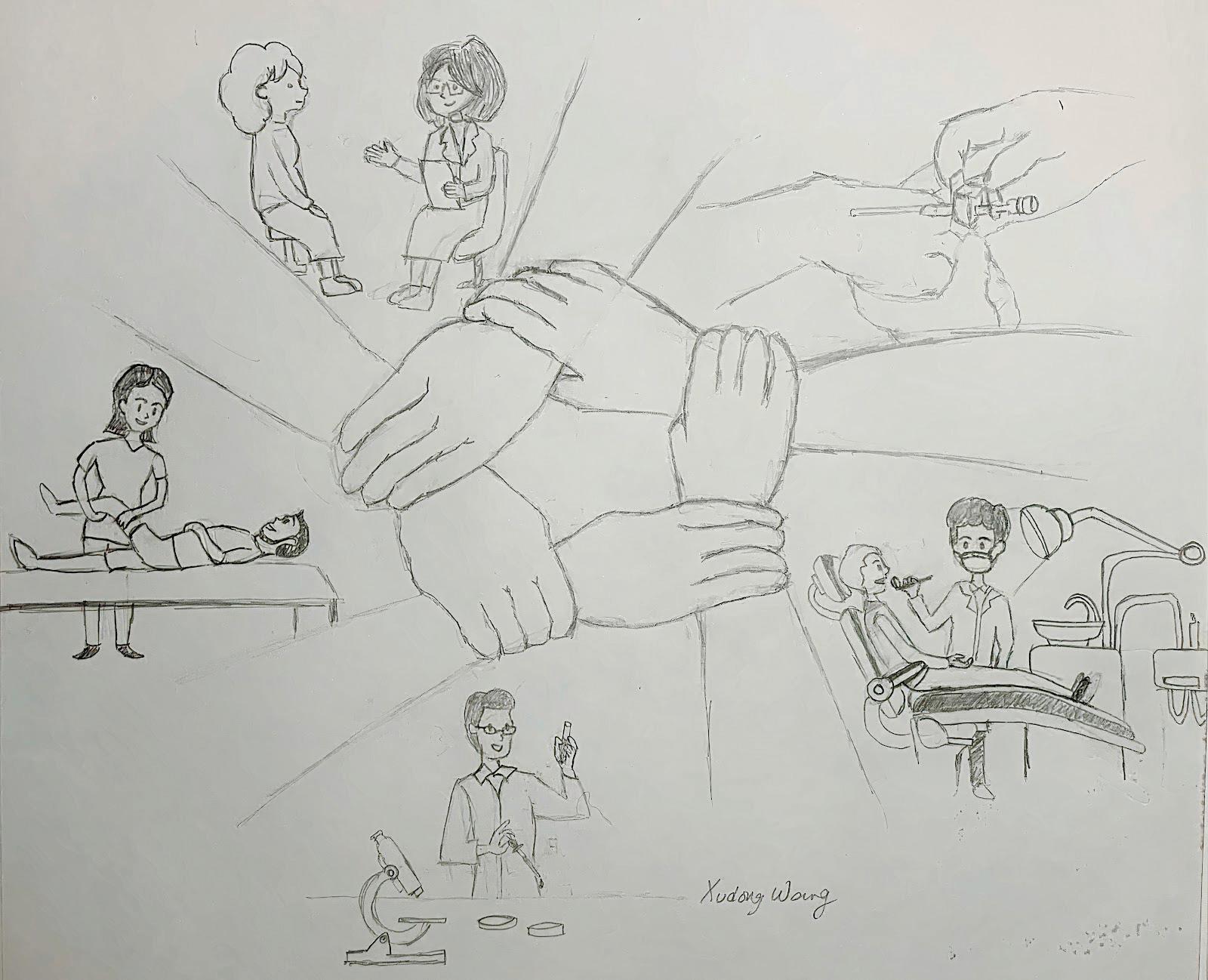
Sketch pad + Pencil
Xudong Wang
Student, Long School of Medicine, Class of 2024
53
Blissful Ignorance
Anna Wedler
Student, Long School of Medicine, Class of 2024
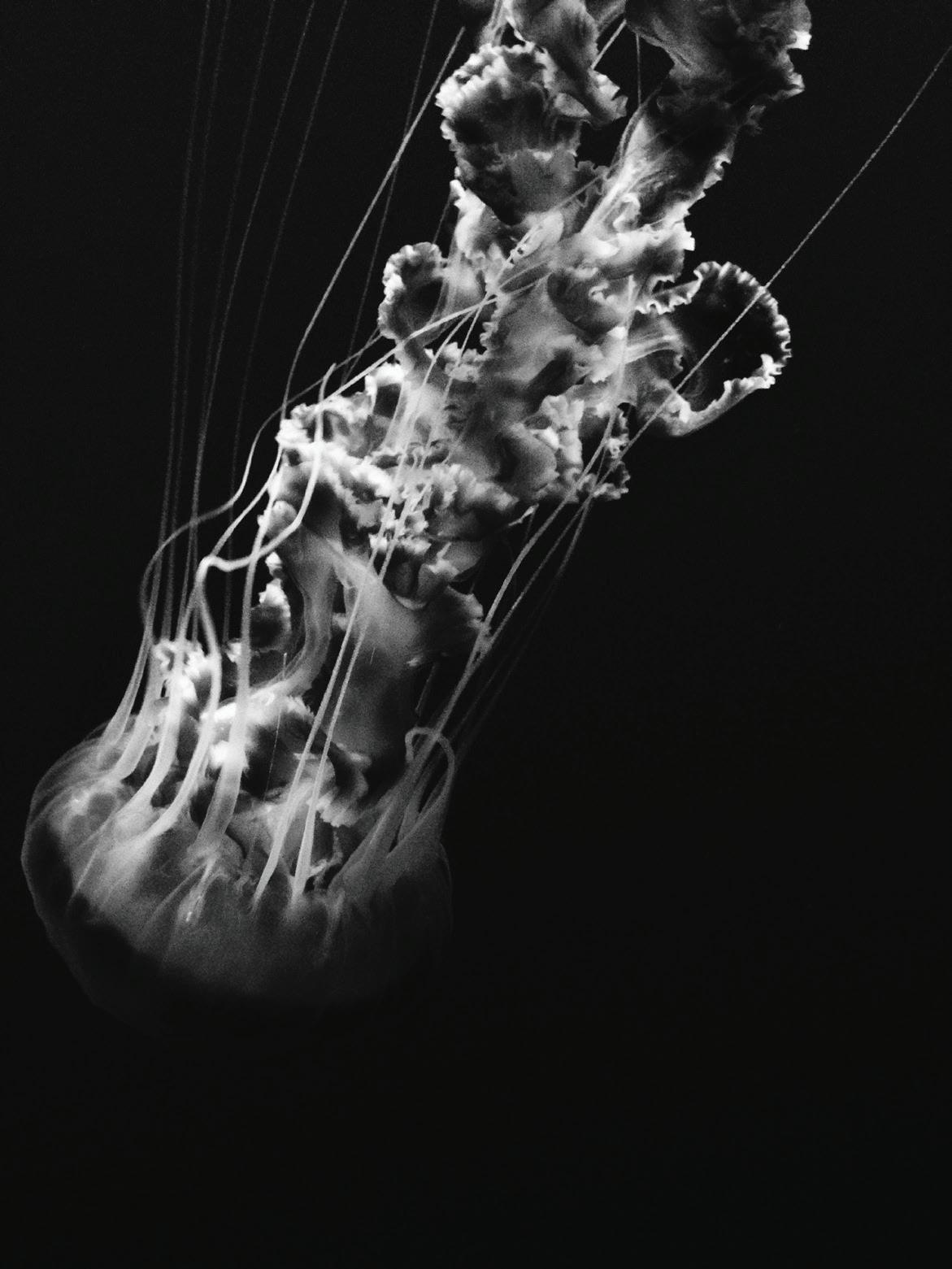
54
The Rosette Nebula

Dawson Tan
Student, Long School of Medicine, Class of 2025
55
Located about 5,000 light years from Earth, the Rosette Nebula is a cloud of hydrogen gas that is best observed in the winter months in the northern hemisphere.
Intuition
Kayla Williams
Student, Long School of Medicine, Class of 2025
I walk through the halls of the vivarium with my tablet, scrolling through my to-do list. I’ve been assigned various tasks for each test subject — cleaning their habitat, collecting tubes of blood, and biopsies of their organs. It differs from day to day, but the nature of the tasks offers a calm monotony that I’ve really come to enjoy. An alert pops up on the screen again — one of the subjects has destroyed their habitat again and needs to be sedated and moved to a new one. I sigh and try not to be too annoyed. I was supposed to meet up with my friend this evening, and I’m always canceling on them because of this research position. Since I’m a student, it’s my job, of course. All the grunt work. But I would never complain when someone could notice, because I’m lucky to be working underneath the Professor.
I fought hard to secure my spot in her class on basic human anatomy and physiology, and then her next class, and then this research position. I had no social life, no fun at all starting out in university. But I did it because it was worth it — I’ve wanted to study humans ever since I knew what they were. And who was better to learn from than the one who wrote the textbooks?
I was just a hatchling when we first discovered humans. The field has been growing exponentially ever since, and there are lots of credits to be earned by joining it yourself. The credits are nice, of course, but that’s not why I’m doing
all of this. The humans intrigue me like nothing ever has before, and I want to know everything about them. I want to know everything they could provide for our planet.
I went over to the next habitat to continue my work, waking up the computer screen with a wave of my hand. With a few taps, the lights of the habitat blink on, and the human rises slowly from where it is curled up on the ground.
Even though I know cognitively that it’s an alien, I forget just how alien it is until I’m up close to it. I observe it through the glass of the habitat, watching as it walks in a circle. The skin is pale, littered with patches of black, blue, and green marks. It gets those from trauma, from the blood escaping from the primitive, fleshy vessels and into the connective tissue. The marks go away eventually, changing color as they heal.
So eerie, yet so fascinating.
The subject looked at me, liquid running down its face. They secrete a water-like substance from their eyes often — the purpose unknown. The Professor and the other assistants are not bothered by this. Reading that it happened in the progress reports is one thing, but seeing it in person … Well. It makes me uneasy, for a reason I’m not sure of.
56
Like it sensed my uneasiness, it came closer to the observation window. I resisted the urge to get away from the window as its eyes darted back and forth, studying me. The subject then opened its orifice and moved it in a strange pattern, creating vibratory acoustic waves, according to the habitat sensor. I held the tablet up to the habitat link to record this data. This is a common human behavior. We’re still trying to decipher the meaning, but the Professor hypothesizes that sound waves are its primitive form of communication. I find the idea … strange. I guess that it’s hard for me to imagine a way of communicating that’s so different from our own. And that’s why the Professor is a genius because she can imagine these types of things. But still … sometimes I dream about what it would say if only it could connect with my neural link like my own people. There would be no need to attempt interpreting the acoustic waves. If only humans were a little more like us, we could understand them so much better.
My thoughts were interrupted with a beep from the tablet — the Professor was summoning me. So early in the day, too. Hopefully, she won't be mad that I haven’t finished my tasks. I went to her office and waited just outside the entrance, waiting for her to sense my presence.
“What’s your report?”
I take a deep breath. Last week after she told me to work on my reports, I practiced them until I dreamt about it. This time, I wouldn’t let her down.
“All subjects are accounted for, alive, and physiology is in
accordance with planned testing stage. M471 destroyed its habitat again — S&R in progress. F387 is once again releasing copious secretions from the lacrimal gland in addition to vocalizations. I observed two different types of sound wave patterns; I have the data for you here.”
I handed the tablet over, willing my hands to be steady, my anxiety hidden. Her mood suggested neither satisfaction nor lack thereof with my report, so I took that as a win. I watched as she examined the data with intense focus, tapping furiously to zoom in and out on the graph.
“Yes, yes. This one here — this high frequency and intensity pattern. It’s erratic and lasts longer than other patterns. It always happens at about this stage of the experiment,” the Professor said, showing me the point on the spectrogram on the screen. The lines of the waveform reached to the border of the screen, unlike the patterns we associate with their attempts at communication.
“Why would that be, Professor?” I prompted her, like I’m expected to do.
She thought for a moment, her eyes never leaving the screen.
“I’m not sure. It could be a defense mechanism of some kind, but …” She paused and turned her chair towards me, like she just remembered I was there.
“What evidence would we need to support that claim?” she asked, leaning toward me expectantly. When I first started
57
at this lab, she didn’t expect much from me. Just cleaning the habitats, doing as I’m told. But lately, she’s been asking me things like this. It excites me that she finally seems interested in teaching me, but also … I’m afraid if I disappoint her the world may self-combust. Or at least my chances at graduate school will.
I need to relax! I just have to tell her what I think. I’ve been studying so hard, so I’ve got this.
“Well … ” I started, shakily, like a hatchling standing for the first time. “Defense mechanisms usually allow some sort of selective advantage for the organism. And this behavior, well it uh … doesn’t seem to slow the progression of starvation at all.”
“Actually, the human expends more energy by engaging in that behavior when it should be conserving it,” I said, more confidently than I started. To my relief she perked up, pleased with my response.
“Yes, very good … You summarized my thoughts quite nicely.”
I tried not to let my pride show too much as the Professor handed the tablet back to me. She gestured for me to take a seat. She often has me sit with her at the end of my time here, sometimes teaching, sometimes just using me as a sounding board for herself. I take my seat, excited about what she will tell me today.
“Humans are not very smart, you see. Their behavior often
is discordant from the optimal path to survival. Even their physiology is like that — the mechanisms the human body uses to protect themselves from pathogens often turn against them, leading to self-destruction.”
She told me about this one specimen, who died suddenly without intervention from us. They found abnormal proteins in the blood, ones that would mark their own tissue for destruction. It was fascinating, as all of her stories are.
“Anyway. Enough of my ramblings. I’m sure that you have more work to do — you should go home.”
That was one thing I liked about her — she never held me too late, unlike the other investigators my friends worked for. I always felt like my time at the lab was well spent. My admiration for her showed through our neural link, letting her know the depth of my appreciation. I rose from my seat and thanked the Professor before heading out to go home.
As I walked down the hallway, F387 resurfaced in my mind — its damp face, its acoustic waves. That feeling of uneasiness returned, making my stomach churn. I tried to push it down, to forget about it — but instead, I was floored with the realization that I could place the origin of that feeling. For some reason that human reminded me of my first pet, a small, furry creature that had died from a sickness. The behavior near the end of its life and the humans were eerily similar. The twitching. The constant movement. The patches of skin that were red, bleeding,
58
and scaly - scratched away by its own hands.
Before I knew it, I had turned on my heel and headed back to her office, desperate for my suspicions to be proven wrong.
“Yes? Did you forget something?” the Professor questioned.
“I wanted to ask one more question … ” I said. “Are you sure that it’s not … in pain?”
The Professor examined me carefully like I was one of the beating hearts she carefully dissected out, trying to unravel my secrets.
“This again?” she said, the edges of her neural barrier tense. “I told you, they have no solicine receptors. They can’t feel a thing.”
“I see, Professor. It just … never mind.” I turned to walk away, but was hit with the Professor’s sudden demand for honesty, stopping me in my tracks.
“No, no. Tell me your thoughts, please,” she demanded. I turned back around to face her nervously, feeling once again like it was my first day here when I knew nothing at all.
But I knew myself. I knew that my emotions were running high, and there is no place for them in this lab. Pushing
them away in favor of logic, I mustered up the courage to speak.
“It seems counterintuitive to think that a species so advanced lacks such a basic function. Even the smallest organisms in our world have solicine receptors,” I said, my words hurried and desperate.
The Professor’s mood relaxed - I must have hid my desperation well.
“A fair assessment, I would say,” she said. She stood and walked over to me, and captured my gaze into her own. I held my breath and she was quiet, selecting her thoughts carefully.
“If you learn anything in your time here, I want you to remember this,” she said, her voice even and firm. “Our intuition is often wrong, especially in sapientology. We must look at the facts objectively.”
Pleased with herself, she sat back down at her desk. I knew she was done talking to me. So I thanked her and left, like I’m supposed to do.
Our intuition is often wrong. Is that true? Her words echoed in my mind, thoughts racing trying to make sense of it. I’m not so sure about that, but what do I know? I’m just a student. I must do what I’m supposed to do.
59
This is not a critique of the use of animals in medical research, but rather a thought exercise on pride and empathy.
Reflection
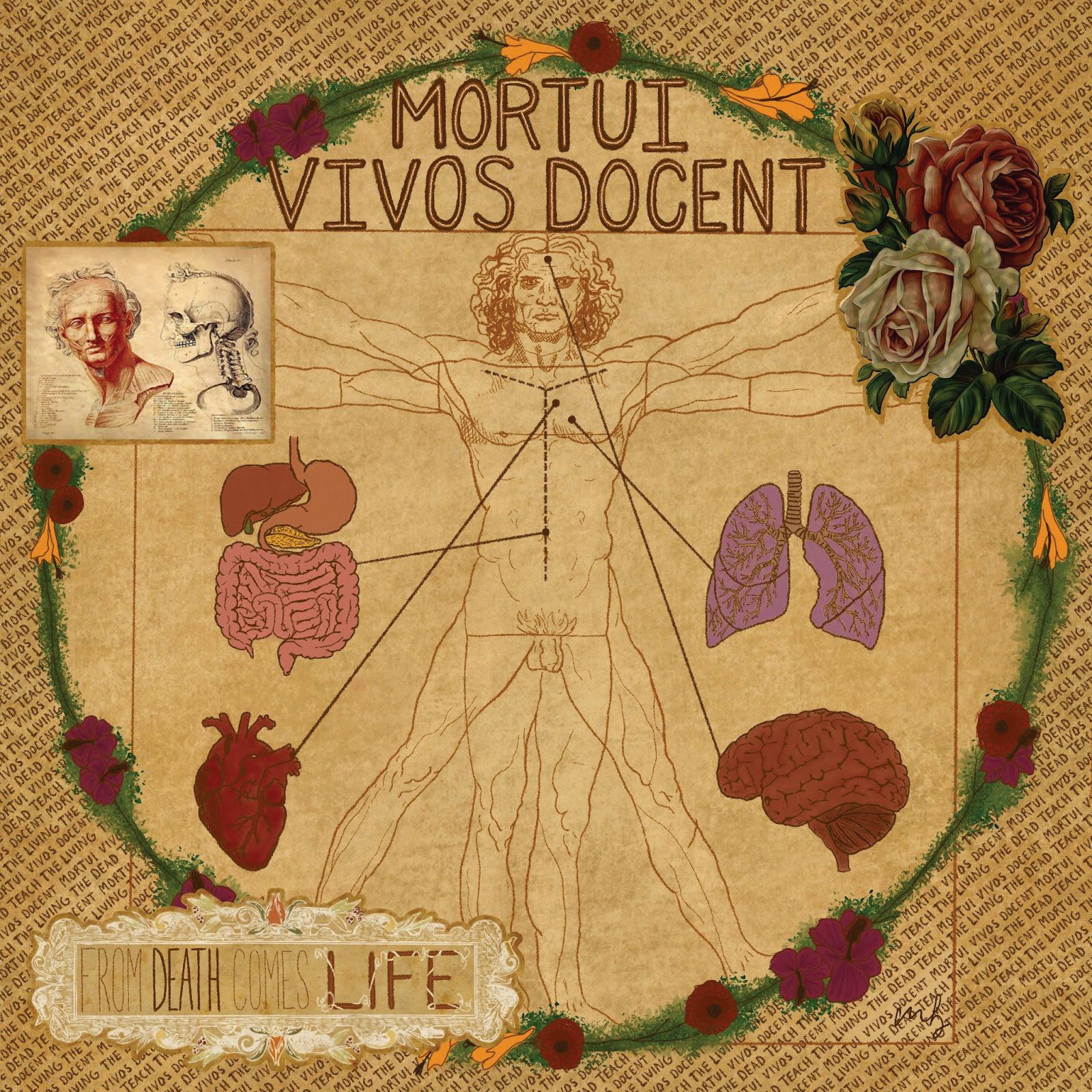
60
Digital Maggie Michelle Beard Student, Long School of Medicine, Class of 2024
Ring Pop Ballet
Acrylic
Lily Hahn, MS3
Student, Long School of Medicine, Class of 2024
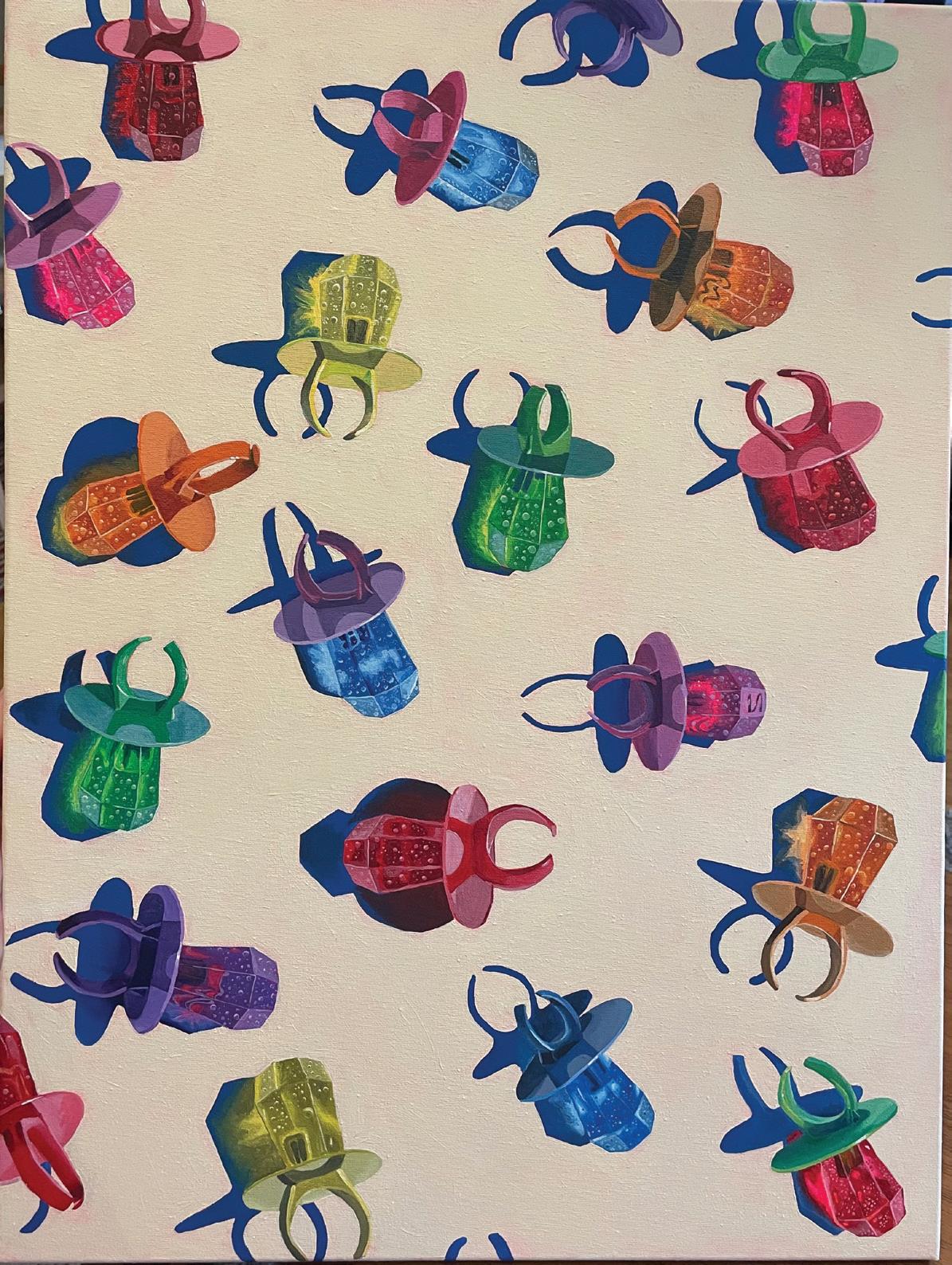
61
55-WORD STORIES
Close to Home
Lynnlee Poe, MS1
Student, Long School of Medicine, Class of 2026
“She wants to be a doctor,” my dad says from his hospital bed. The doctor turns to me, “So you want to be stupid?”
I respond “Yes” without a second thought. Because what other field could turn a man seventeen minutes dead back into the father that six children feared they may never have again?
55-WORD STORIES
His Broken Heart Doesn’t Need Fixing
Alex Deleon Student, Long School of Medicine, Class of 2024
I heard his heart murmur in the morning. He played soccer in the afternoon with me. I told his parents he may not live long. He laughed as I practiced my Spanish.
I grieved when we could not help him. He needed open heart surgery. We went our separate ways. We will not meet again.
62
Then Flourish
Mixed media (marker, watercolor)

Aamerah Haque
Student, Long School of Medicine, Class of 2026
63
One of a Billion
David K. Twitchell, MD Resident, Internal Medicine
One billion people, that’s 1 out of 8. That’s the number of people who don’t feel so great. Fever or chills are not the maladies they suffer, But rather from a mental illness for which the claimed cure is . . . “Just be tougher”.
But truth be told, this is easier said than done, Because though you are one of a billion, you feel like the only one.
Depression and anxiety are conditions not trivial or mere. In fact, their lost productivity totals $1 trillion each year.
So what causes this so-called “figment of the mind”? A mix of chemistry, genetics, and also being treated unkind.
Many consider the realm of mental health a great enigma, Likely because it is harder to face the truth than embrace the stigma.
So how do you treat these common conditions? Medications and therapy play a large role in fulfilling this mission.
But what to do if these paths aren’t quite your vibe? Start with deep breathing, mindfulness, and identify feelings with words to describe.
Life may at times feel too heavy and you may just want to be done.
To the point that you can’t bear the thought of seeing the next morning sun.
Before you act, I plead with you to wait, And call a friend or dial 9-8-8.
You may feel hesitant to start this path toward healing. But don’t let fear of judgment chain you in the misery you are feeling.
Medical professionals are trained to be compassionate and to listen.
So please help yourself escape this otherwise endless mental prison.
There is no shame in getting the help you need. If nothing else, I hope this poem plants a seed.
64
In this piece, I sought to address some of the leading misconceptions surrounding mental health diagnoses and provide education on the topic. Additionally, I hoped to inspire people in need of mental health services to overcome their own barriers and start the journey of getting the help they need.
Motherly advice
Jose E. Cavazos, MD, PhD Faculty, Neurology
Motherly advice
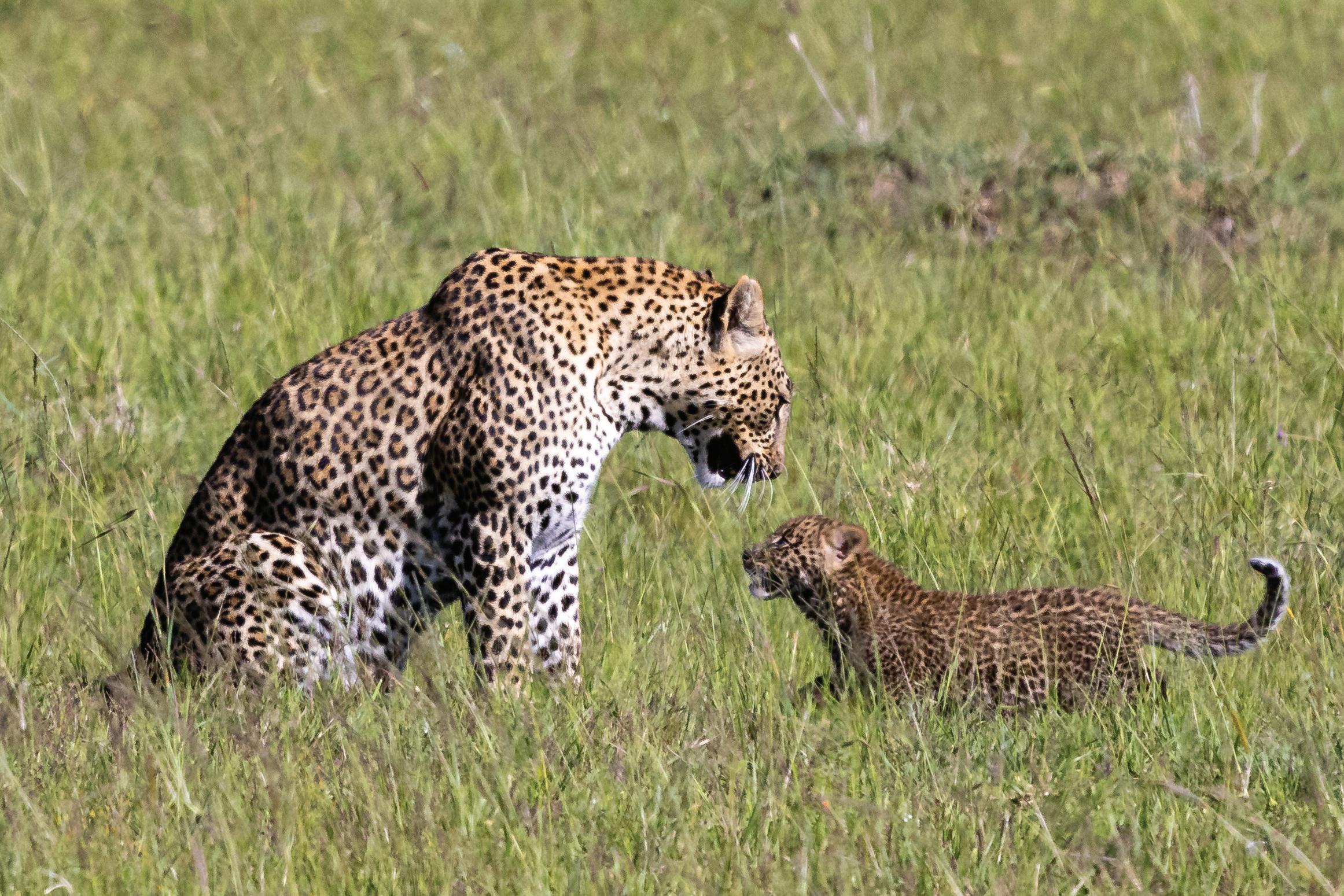
65
A Work in Progress
Hannah Burks
Student, School of Health Professions, Class of 2023
It has been three years since I began the study of occupational therapy. As my higher education comes to a close I reflect on all the ways I have changed. I have lost: one boyfriend, many nights of sleep, touch with old friends, faith in landlords, anxiety towards talking to authority figures, and any curiosity I had about what it would be like to endure a global pandemic.
I have gained: an adorable dog, three UTIs, a fear of squirrels, a new boyfriend, new hobbies, an amazing group of friends, confidence in my personal and professional life, an understanding of my inherent ableism, hands-on skills, and clinical reasoning.
I have learned how to: fabricate splints, plan treatment sessions, transfer patients safely, modify environments to support participation, promote sensory processing, and operate physical agent modalities.
Despite these changes, I still have so much growing left to do. I am not who I thought I would be at this stage in my life. I am still afraid that whenever I cook chicken, I will get salmonella!
I started school knowing only the concept of occupational therapy. I had seen it in action but had yet to grasp what it meant to look at the world through an “occupational
lens.” I wanted so desperately to be a great therapist. I thought that when I finished grad school I would have all this hidden knowledge known only to the discerning practitioner. I thought that I would walk into a room and be a confident clinician — steadfast in every decision, able to decide what each patient needs through some supernatural reasoning that would have magically manifested following my rotations.
Sadly, that is not the case. Three years of intense training later and I am not an amazing occupational therapist. I still get nervous when I first meet patients, I drop things, sometimes I speak with too many words while I am explaining a new activity, and three months ago I tripped over a man’s IV and almost sent him flying to the ground. I have failed time and time again.
Yet, when I was taking one of my patients through weightbearing activities she looked at me and said “I can tell you really love what you are doing, you are tall and can lift people up, you are going to be a great physical therapist.” Although the profession was wrong, the sentiment was there. She was one of my favorite patients. We bonded over our mutual love of dogs and Trader Joe’s. I want to continue to grow and learn so that I can be a great occupational therapist for people like her. Although, I don’t think I will ever get over my fear of cooking chicken.
66
How to Get a White Coat Digital Media
Aamerah Haque Student, Long School of Medicine, Class of 2026
I created this autobiographical piece because I wanted to chronicle my experience in applying to medical school, and all the hardship and uncertainty it entailed. When I look back, I admire my past self for her incredible strength and resilience, and I am proud of her for not giving up on her dream despite the many challenges that came her way.
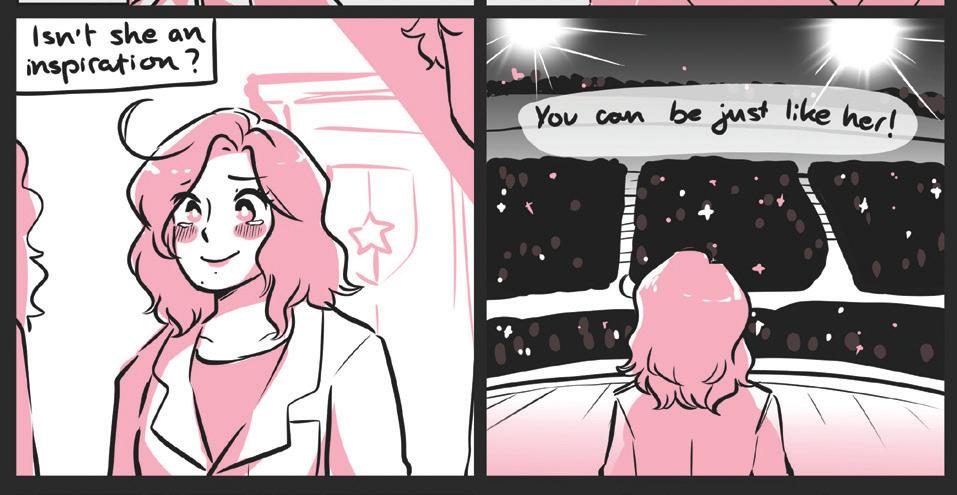
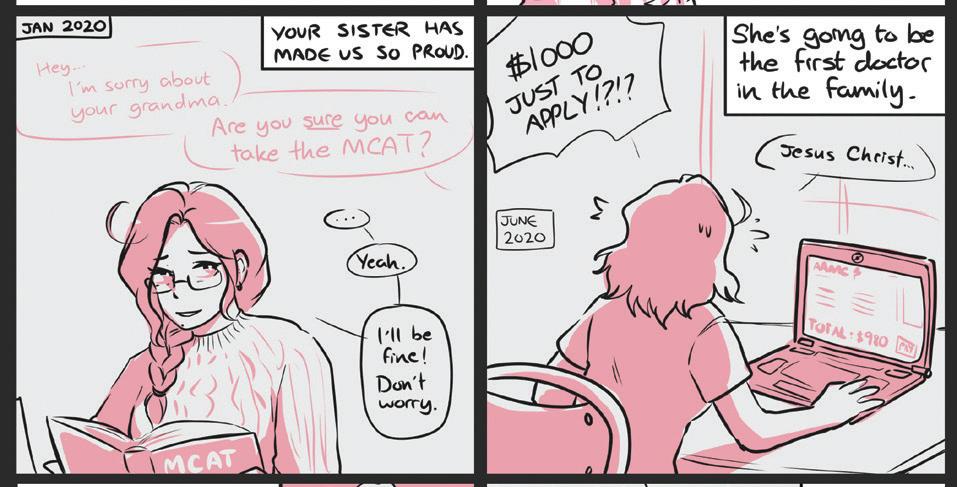
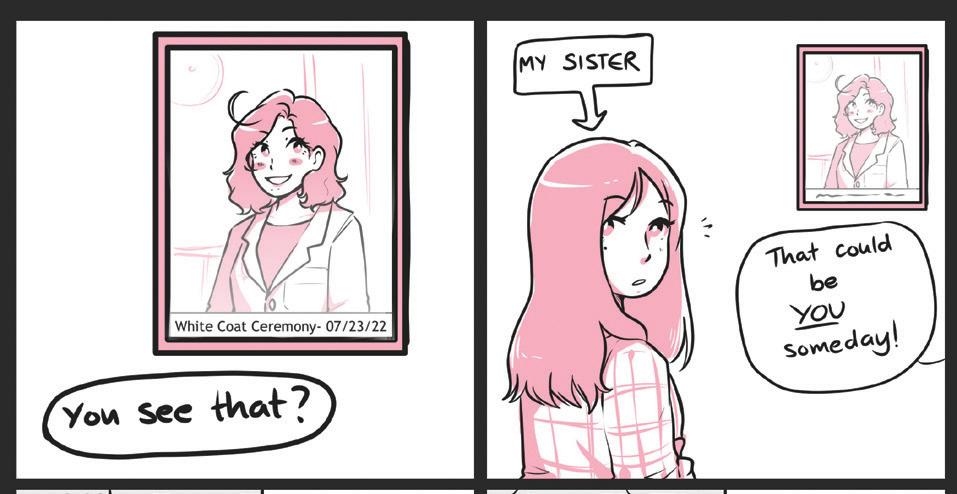
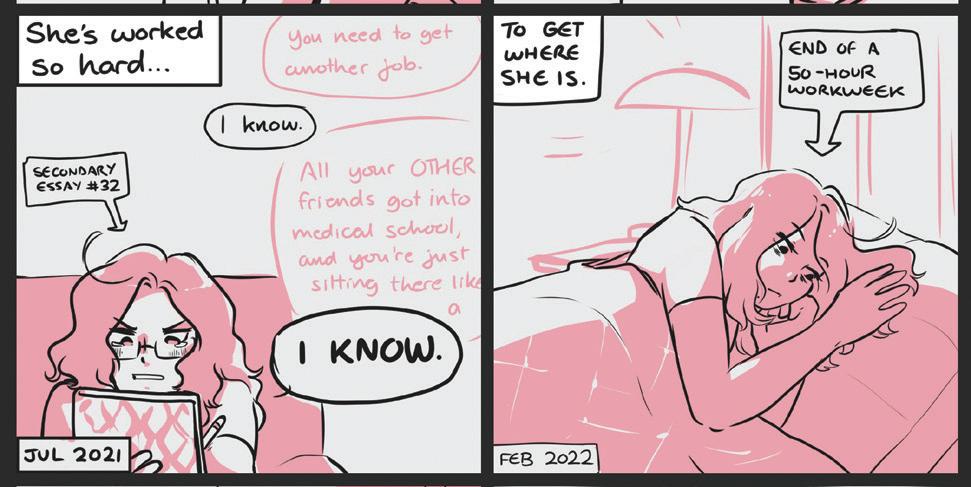
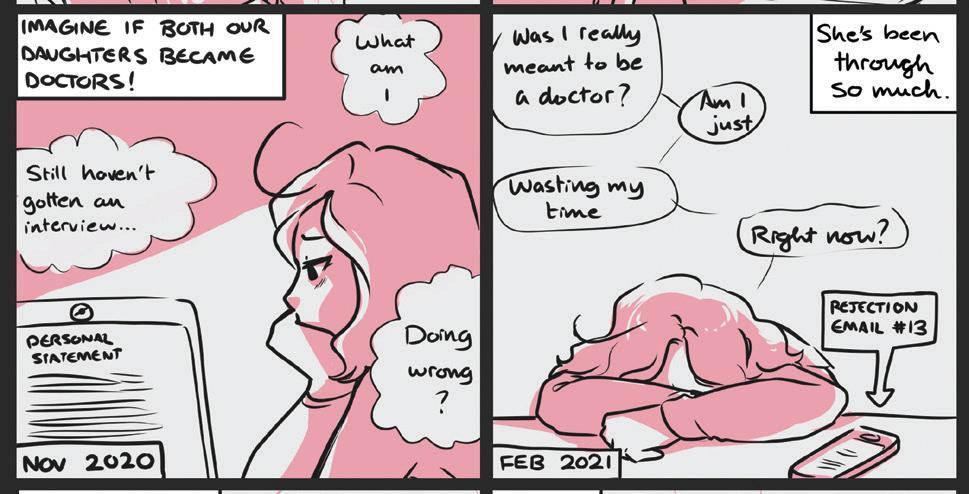
67
Together We Reach Great Heights
 Anna Wedler
Student, Long School of Medicine, Class of 2024
Anna Wedler
Student, Long School of Medicine, Class of 2024
68
Night Shift
Gouache on canvas
Beverly Hu
Student, Long School of Medicine, Class of 2026
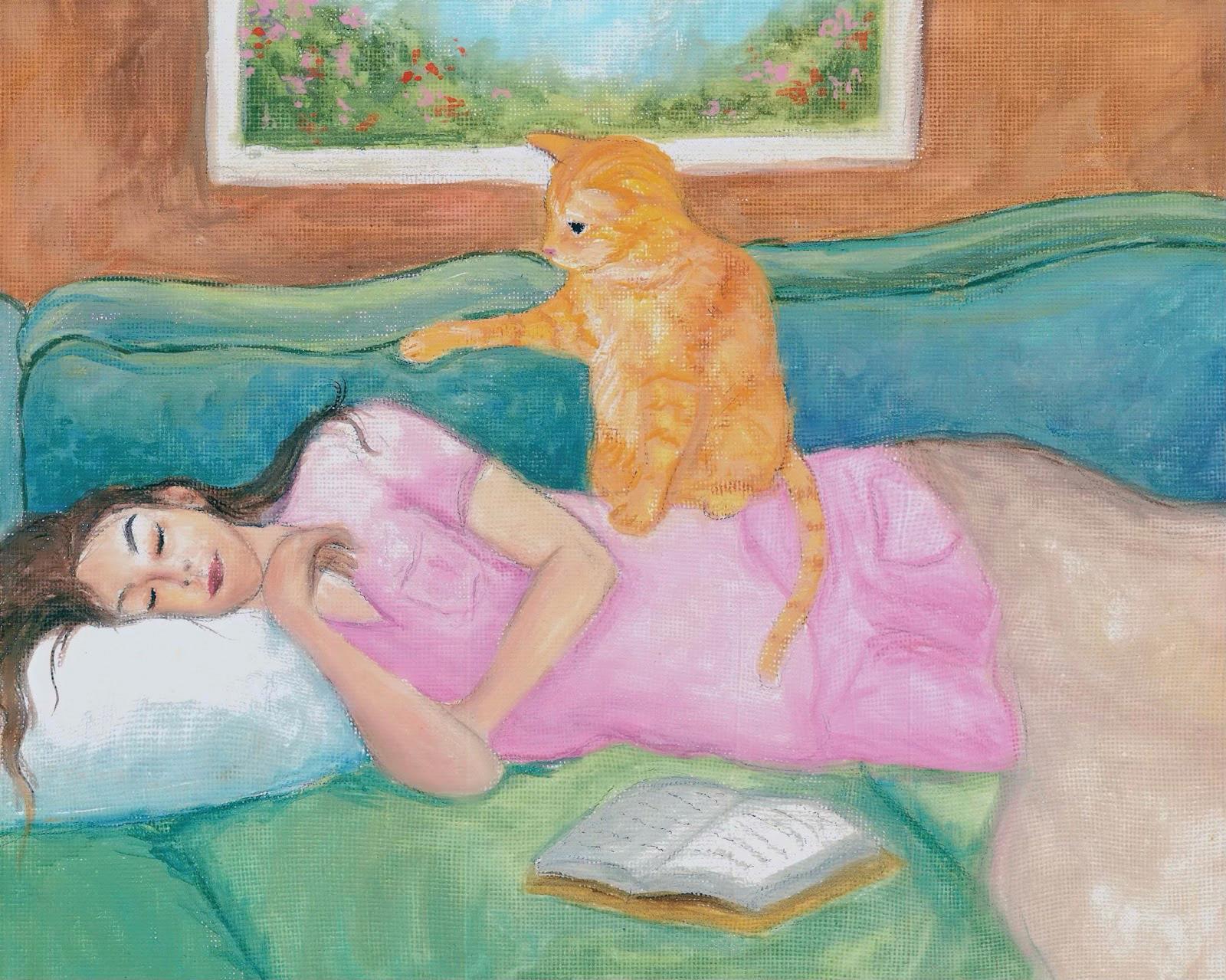
69
Bedtime Keeps Me Going
David K. Twitchell, MD Resident, Internal Medicine
8 patients, 60 orders, 11 phone calls, 6 hours of sleep, and 13 hours away. That is my typical day. Plenty of work, Plenty of stress I work daily auscultating the chest.
As I drive home, my thoughts drift away
To the beats of Latino pop that in my car play. This time is precious, my mind unwinds. This is the time for me to forget the grind.
When I arrive home, my work ends at the door. I am greeted by wagging tails that often knock my daughter to the floor. Now time for dinner, all together at last The daylight fades, another day passed.
Now it’s bedtime, mom’s favorite part. Little teeth are brushed, her laugh warms my heart. Which books to read, I let her choose.
First one, then two, now all in the queue.
Hands down these moments are the best of the day. I know I have plenty of cuddles coming my way. We pray for mommy and for help sleeping through the night.
I lay her down as her little arms hug Mr. Bear tight.
I go downstairs to watch a show with my wife. Clearing my head from the toil and strife. Now time for bed for some much-needed sleep. The time flies by to when my 4:45 AM alarm beeps.
My life is challenging, but it is the best. My time at home leaves me feeling refreshed. Someone once asked me how each day I force my knowledge to continue growing. While there are many factors, the most truthful answer is . . . bedtime keeps me going.
70
This piece showcases the source of my perseverance and highlights my most important community, my family. I am very grateful for their support and treasure the moments I can spend with them.
Knock Knock
Noah Alexander Fanous
Student, Long School of Medicine, Class of 2024
Knock Knock
If I do not hear a tree fall in the forest, can I not dismiss death at my door?
He knocks, a dinner guest, too early for my courtesy. He should wait like everyone else!
Knock knock
No, not today.
And especially not with all my special guests that have listened.
Knock knock knock
My wife, she has listened. The smell of fresh bread wafting like a buttered cloud throughout the kitchen. My children have listened. The changing of silverware and snickering surround a set table. And my friends, they have listened, arriving one by one, cringing as they slip past our unexpected guest — one notorious for poor taste, etiquette, and now, timing.
Knock knock knock
I would tell him to fuck off, but what kind of host would even have the thought?
Apparently, me.
The following piece plays with the idea that Death is all too often a dinner guest that has arrived a bit too early for everyone's comfort. If so, why should we not treat him as such, and leave him waiting at the door?
71
Morning light with Fall Foliage on the Cypress Trees of Caddo Lake
 Richard Usatine, MD Faculty, Long School of Medicine
Richard Usatine, MD Faculty, Long School of Medicine
an eerie
72
These bright colors light up the old Cypress trees on Caddo Lake every fall. The vivid fall colors create
composition with the silvery moss that hangs from these grand Cypress trees. A small dead Cypress tree has silvery small branches that are lit up in the early morning light.
Through creative expression and reflection, we nurture our collective humanity and cultivate meaningful connections among students, faculty, staff, patients and friends of UT Health San Antonio.
We are .


 by Anna Wedler Student, Long School of Medicine, Class of 2024
by Anna Wedler Student, Long School of Medicine, Class of 2024


 Ruth Berggren, MD, MACP Professor of Medicine Director, Center for Medical Humanities and Ethics
Ruth Berggren, MD, MACP Professor of Medicine Director, Center for Medical Humanities and Ethics
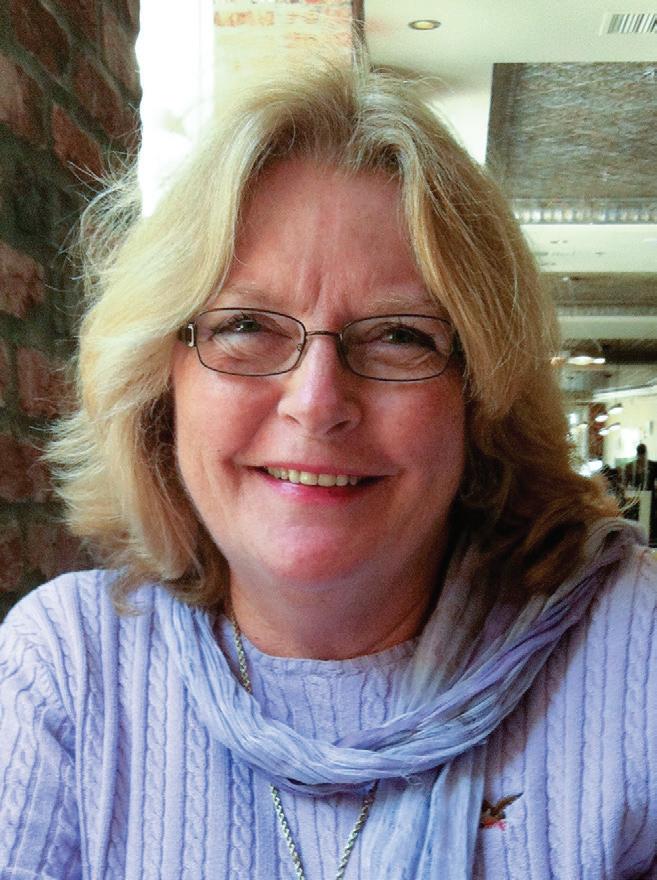

 Richard Usatine, MD Faculty, Long School of Medicine
Richard Usatine, MD Faculty, Long School of Medicine
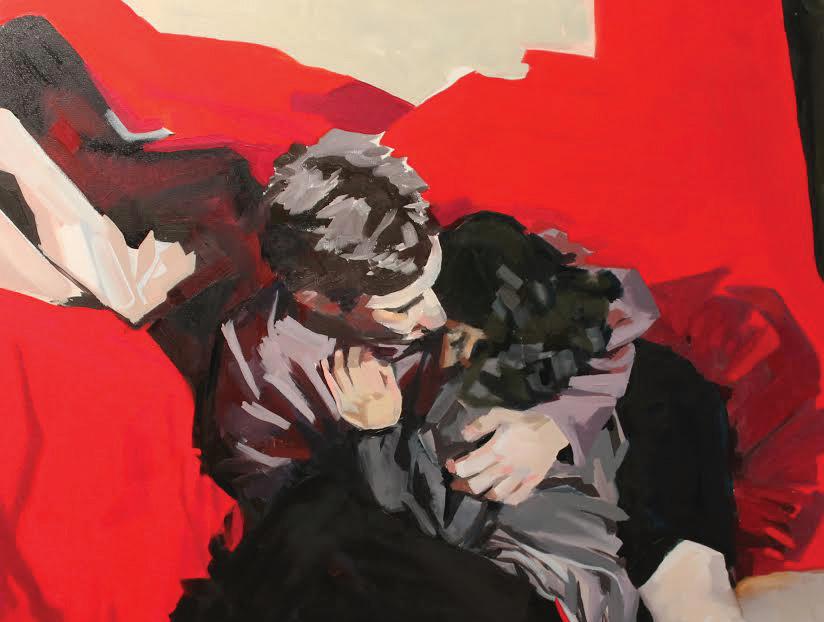 Katherine Thiel, MD Resident, Internal Medicine
Katherine Thiel, MD Resident, Internal Medicine
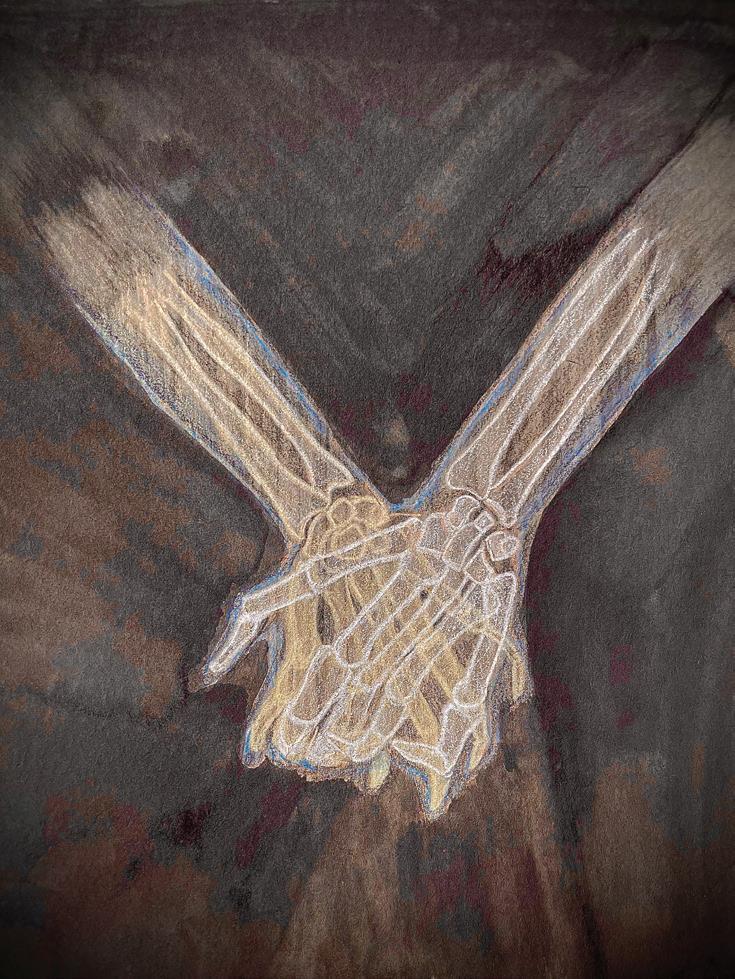 Theresa Heines, BSN Student, Long School of Medicine, Class of 2024
Theresa Heines, BSN Student, Long School of Medicine, Class of 2024

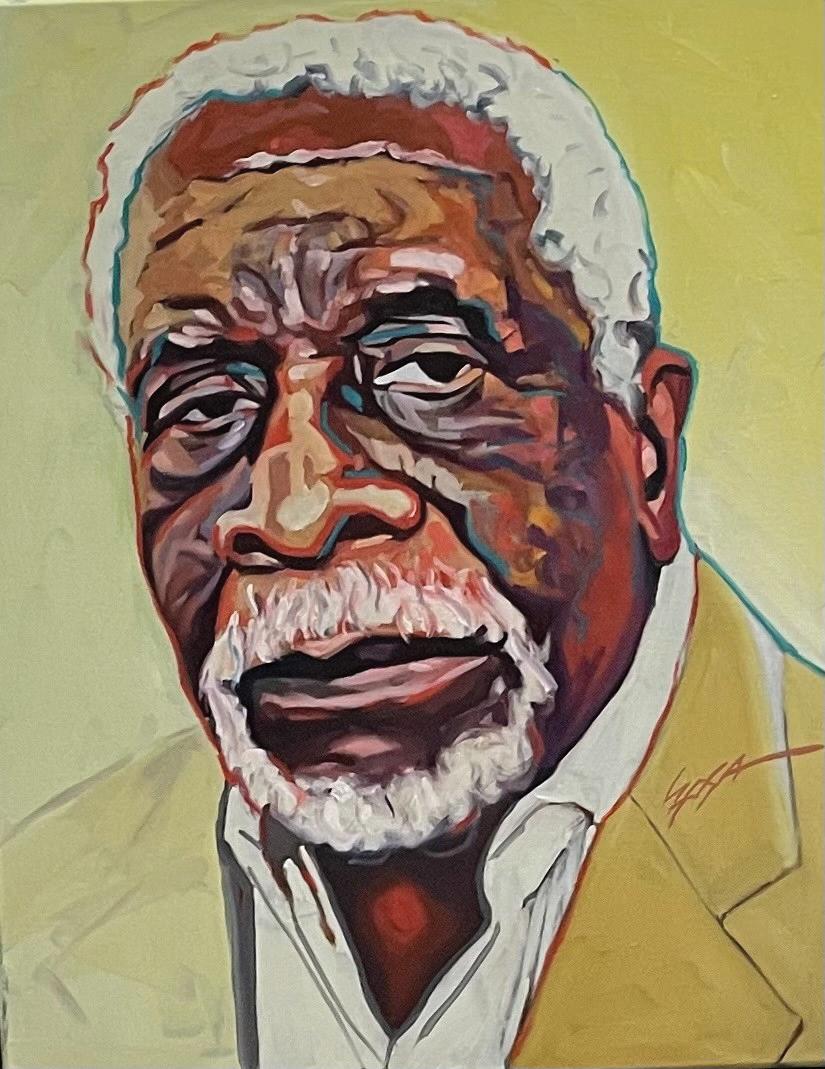
 Sarah Cox
Sarah Cox
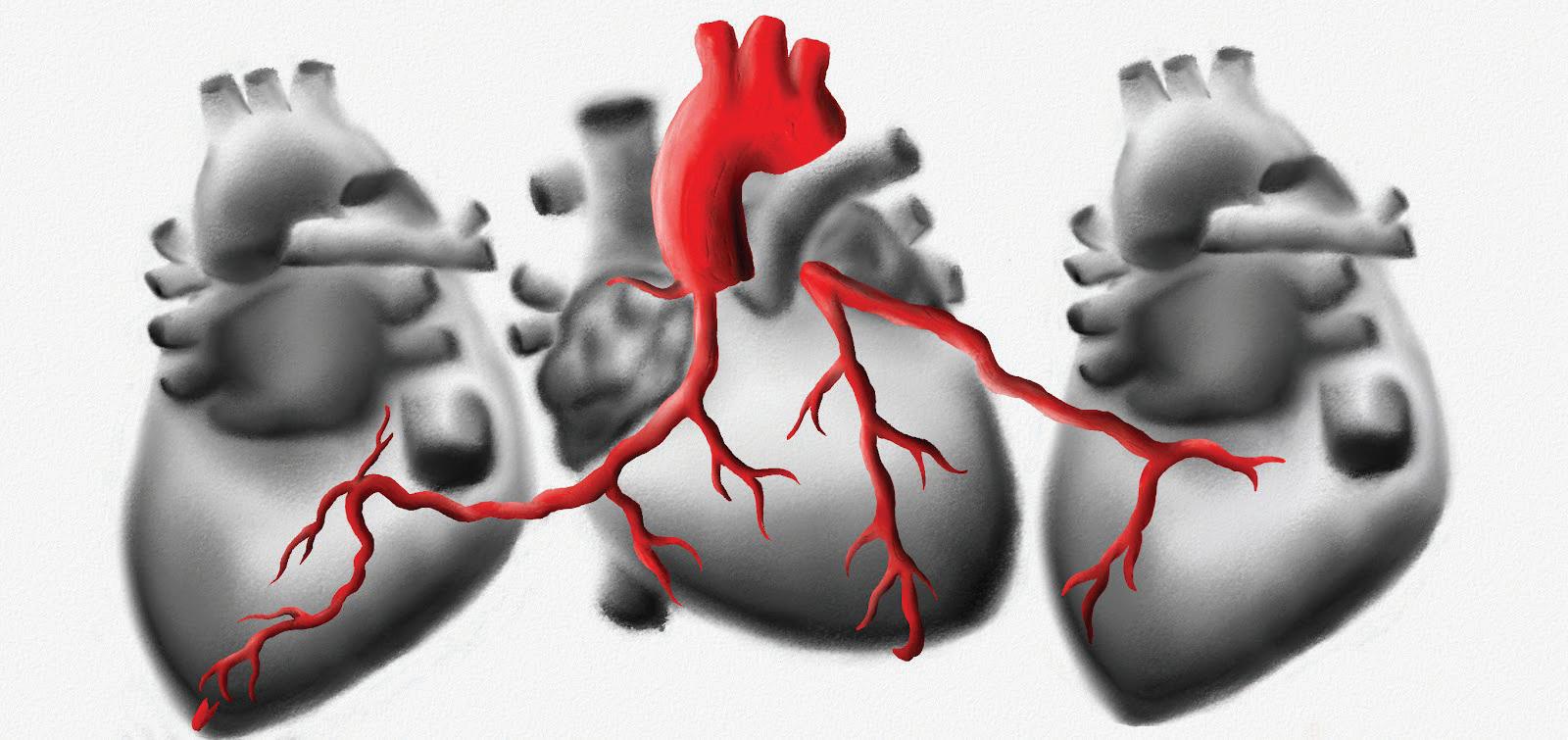
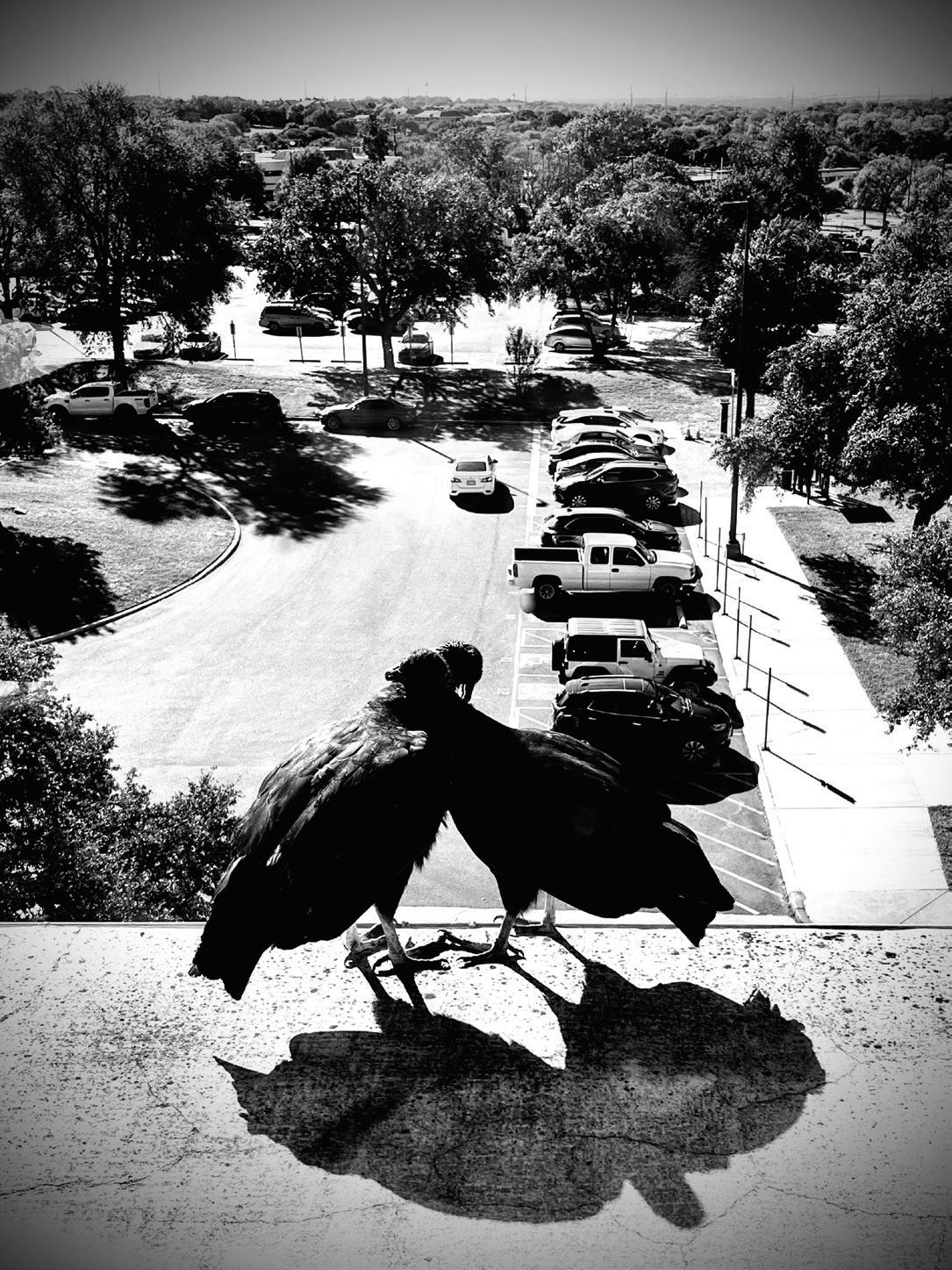 Student, Long School of Medicine, Class of 2026
Student, Long School of Medicine, Class of 2026
 Sarah Cox
Student, Long School of Medicine, Class of 2023
Sarah Cox
Student, Long School of Medicine, Class of 2023


 Alexis Lorio Student, Long School of Medicine, Class of 2024
Alexis Lorio Student, Long School of Medicine, Class of 2024

 Katherine Thiel, MD Resident, Internal Medicine
Katherine Thiel, MD Resident, Internal Medicine
 Annie Flores
Annie Flores
 Nancy Gillcrist, MD, USAF, Capt
Resident, Urology, Class of 2023
Nancy Gillcrist, MD, USAF, Capt
Resident, Urology, Class of 2023


 Andrew Ta
Student, Long School of Medicine, Class of 2026
Andrew Ta
Student, Long School of Medicine, Class of 2026
 Divya Chandramohan, MD Fellow, Infectious Diseases
Divya Chandramohan, MD Fellow, Infectious Diseases

 Beverly Hu
Student, Long School of Medicine, Class of 2026
Beverly Hu
Student, Long School of Medicine, Class of 2026


 Averi E. White, MD Resident, Internal Medicine
Averi E. White, MD Resident, Internal Medicine
 Sarah Cox
Student, Long School of Medicine, Class of 2023
Sarah Cox
Student, Long School of Medicine, Class of 2023














 Anna Wedler
Student, Long School of Medicine, Class of 2024
Anna Wedler
Student, Long School of Medicine, Class of 2024

 Richard Usatine, MD Faculty, Long School of Medicine
Richard Usatine, MD Faculty, Long School of Medicine